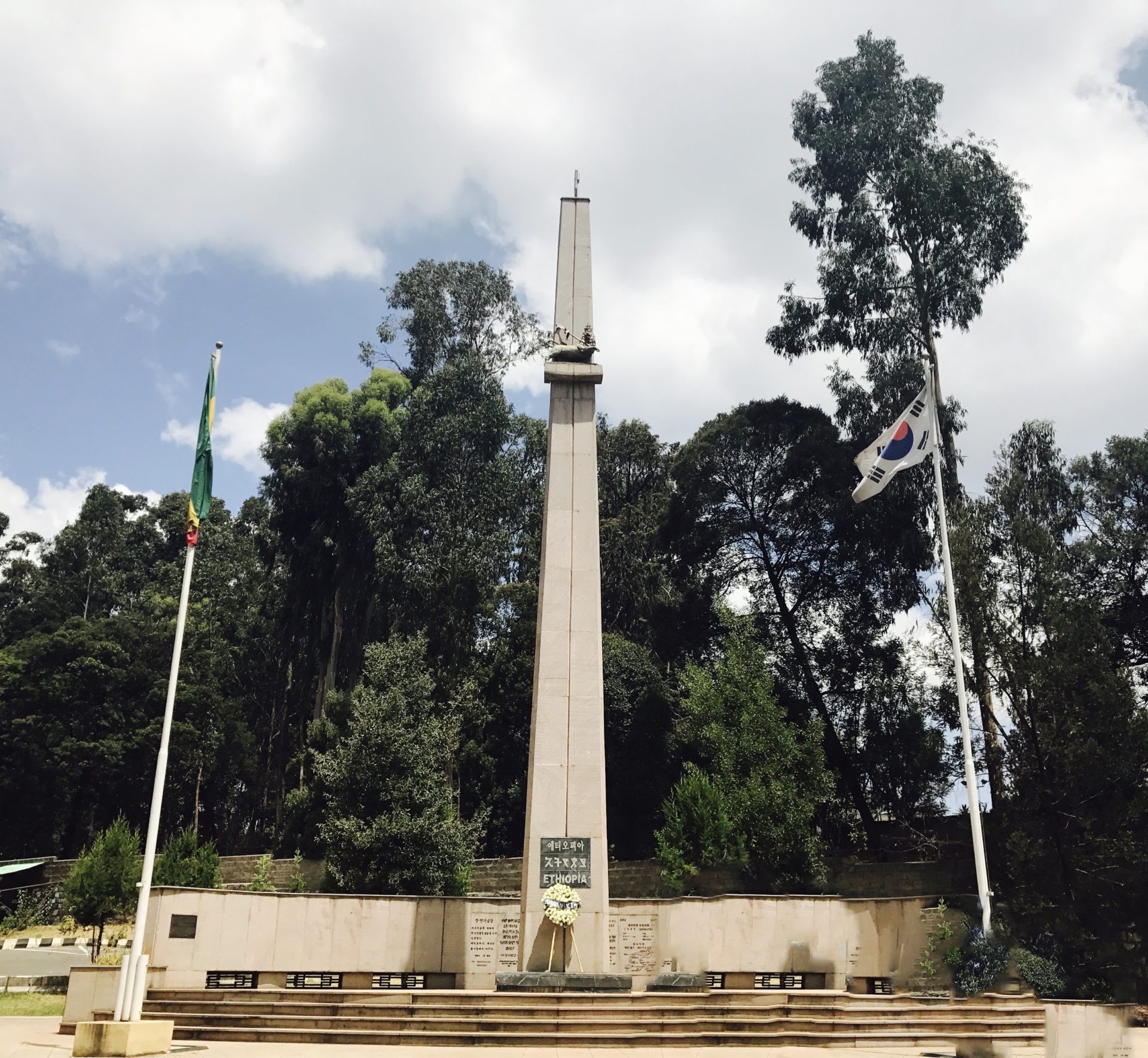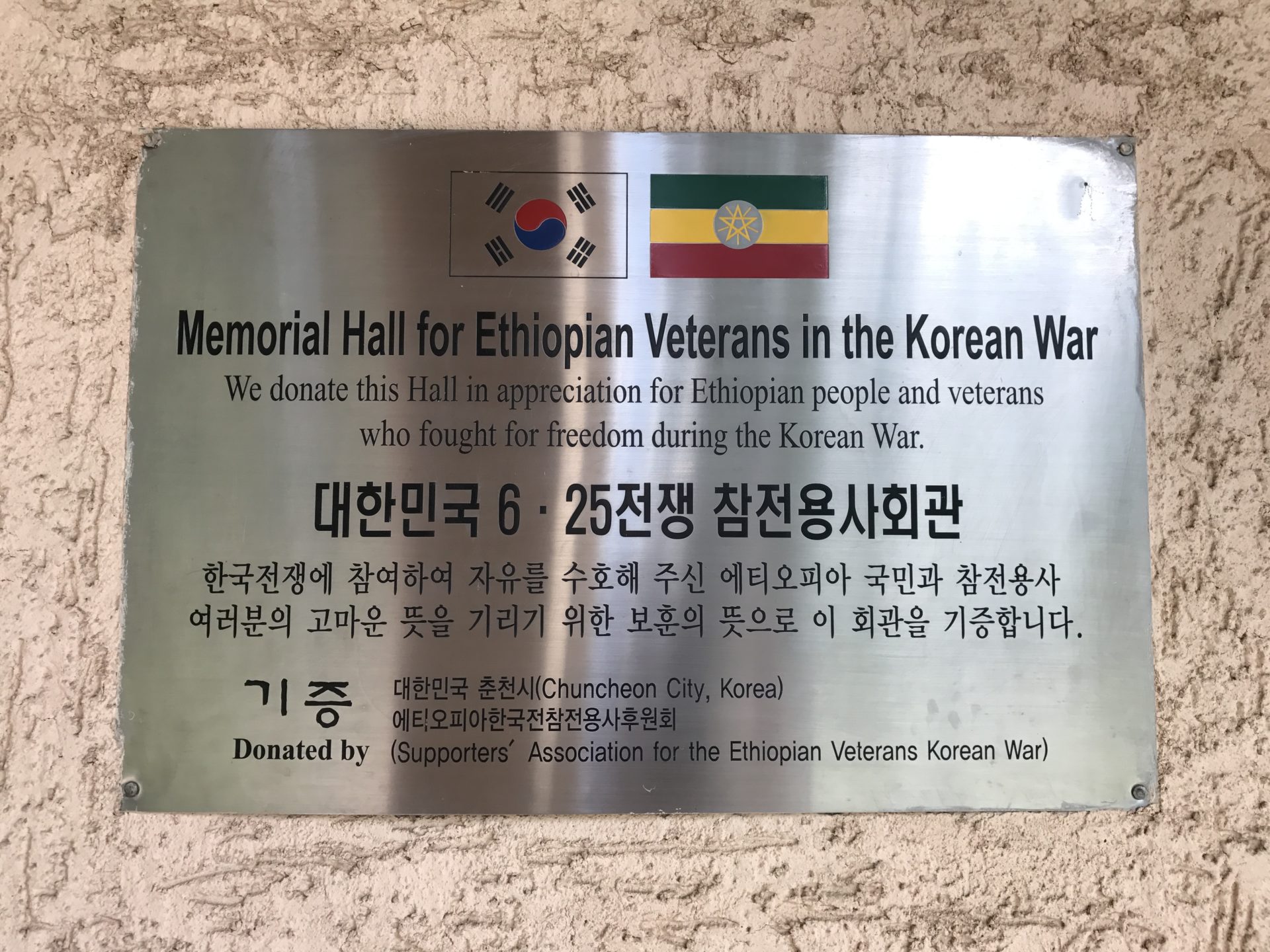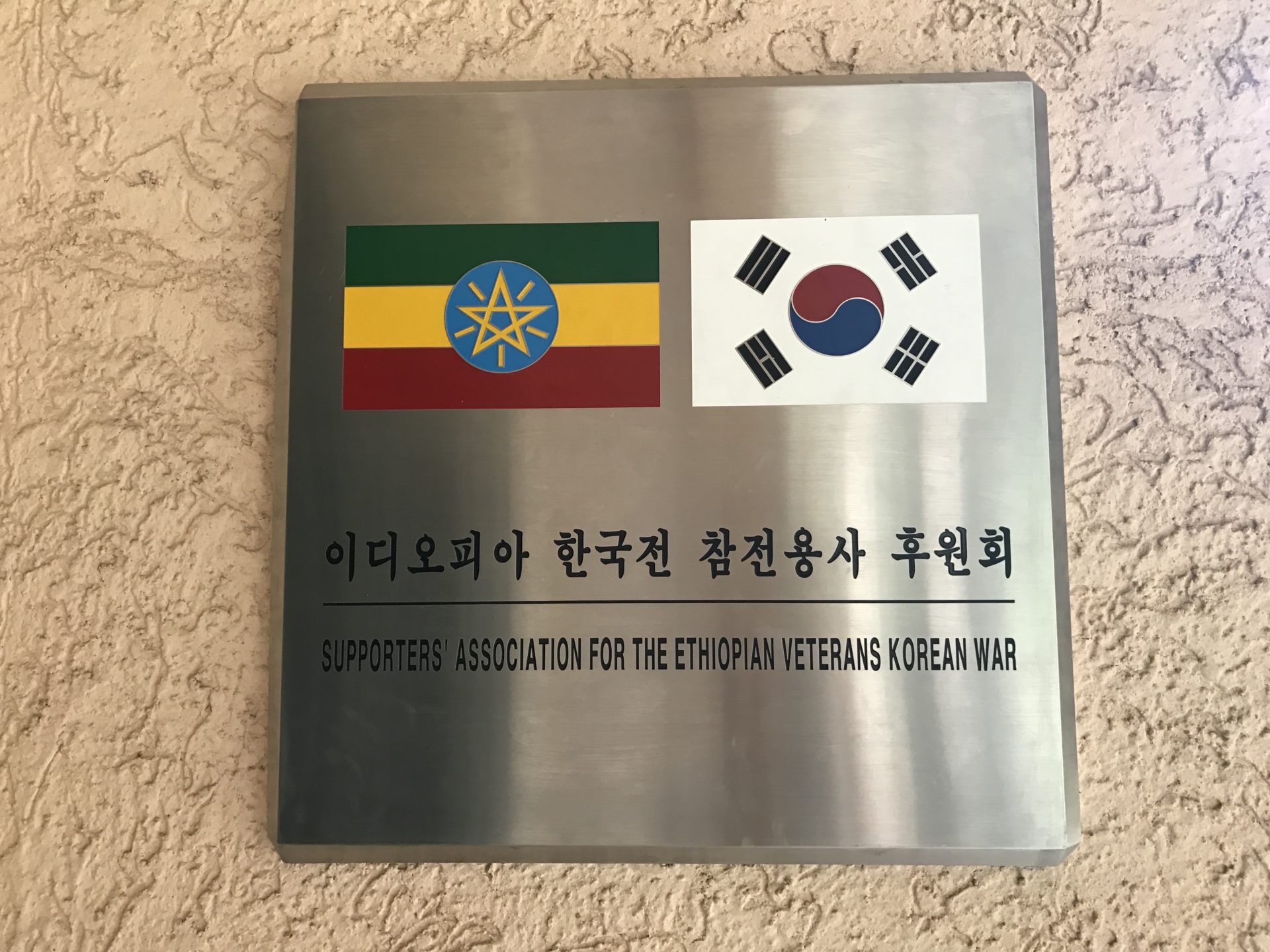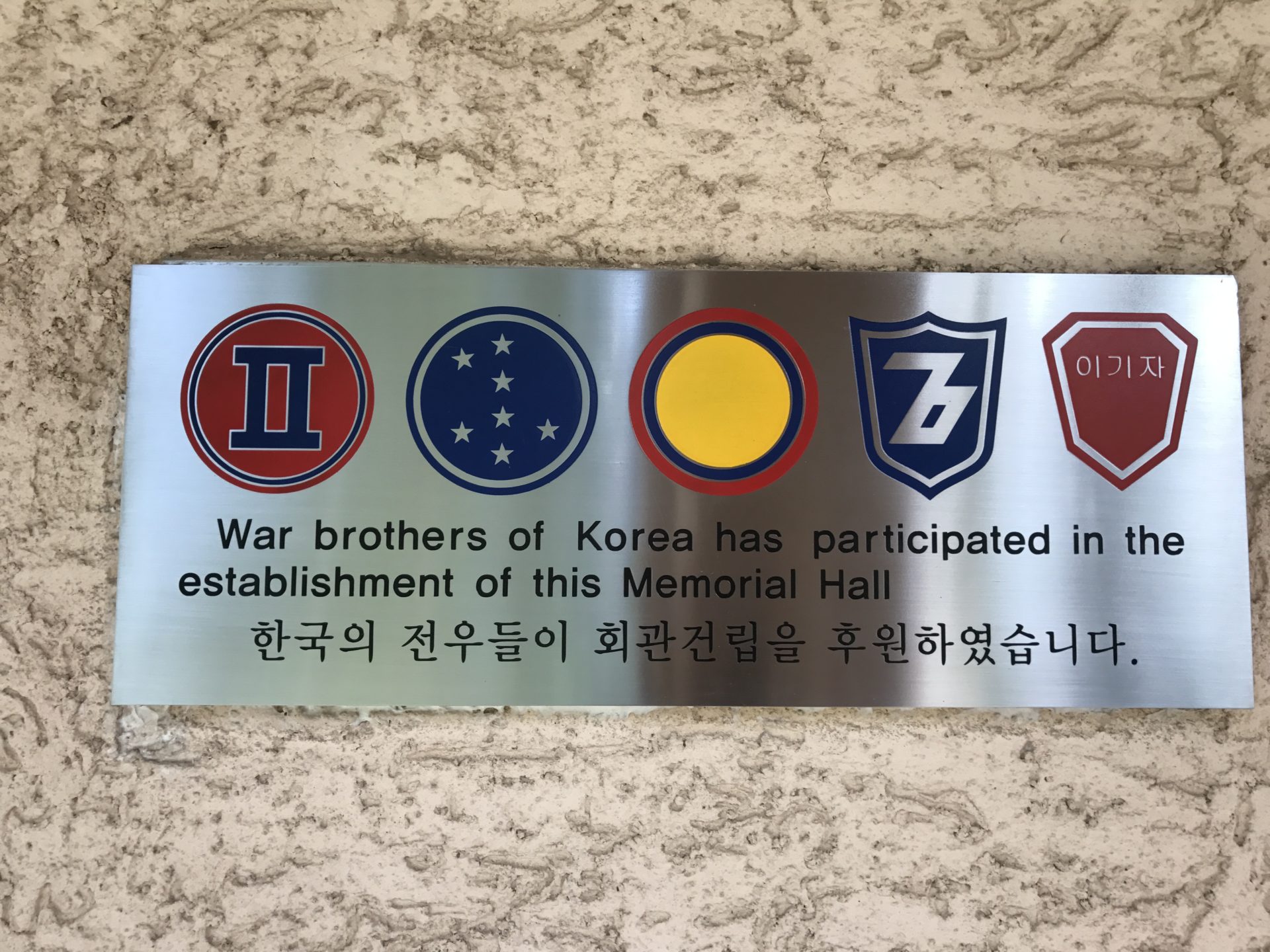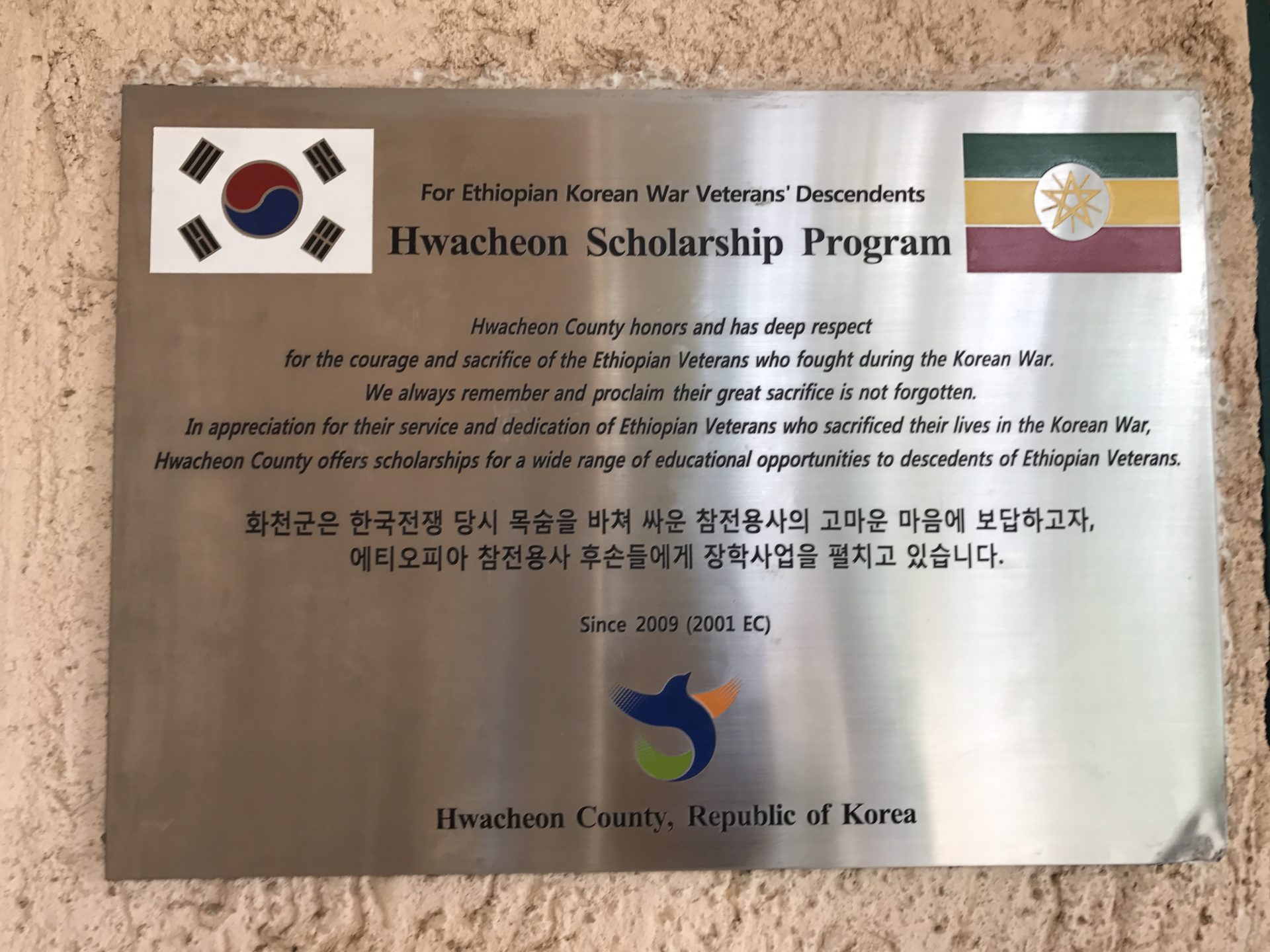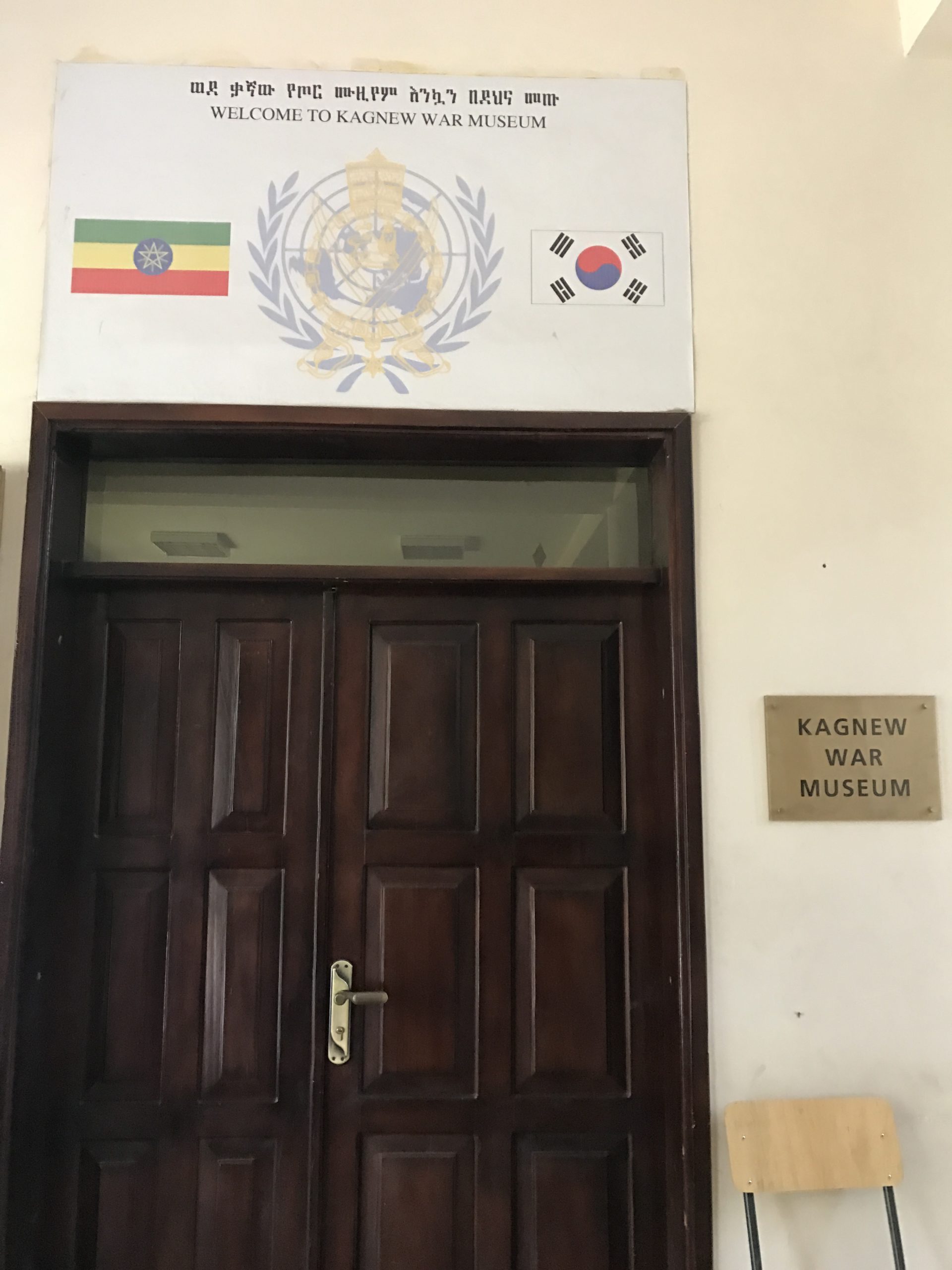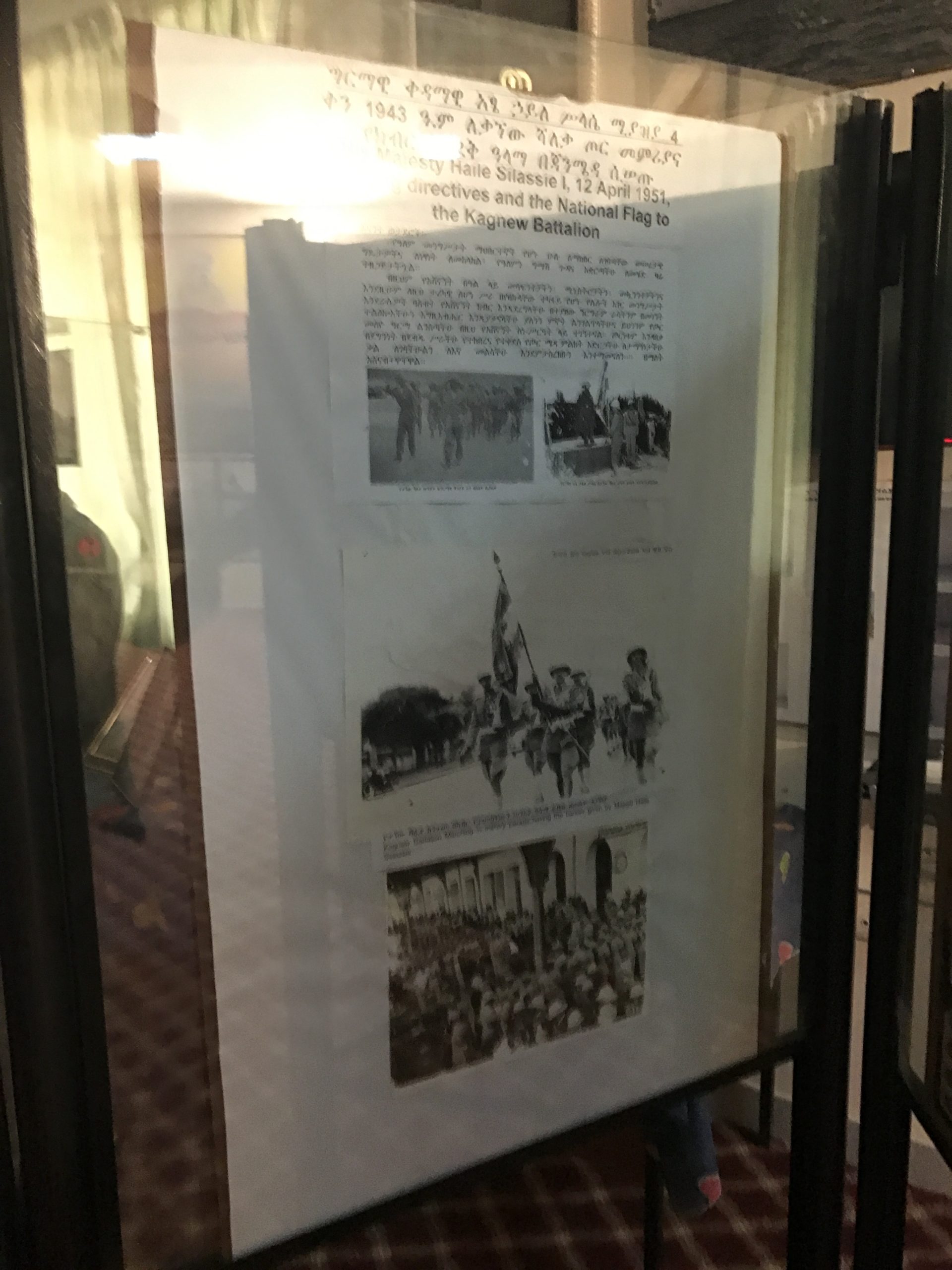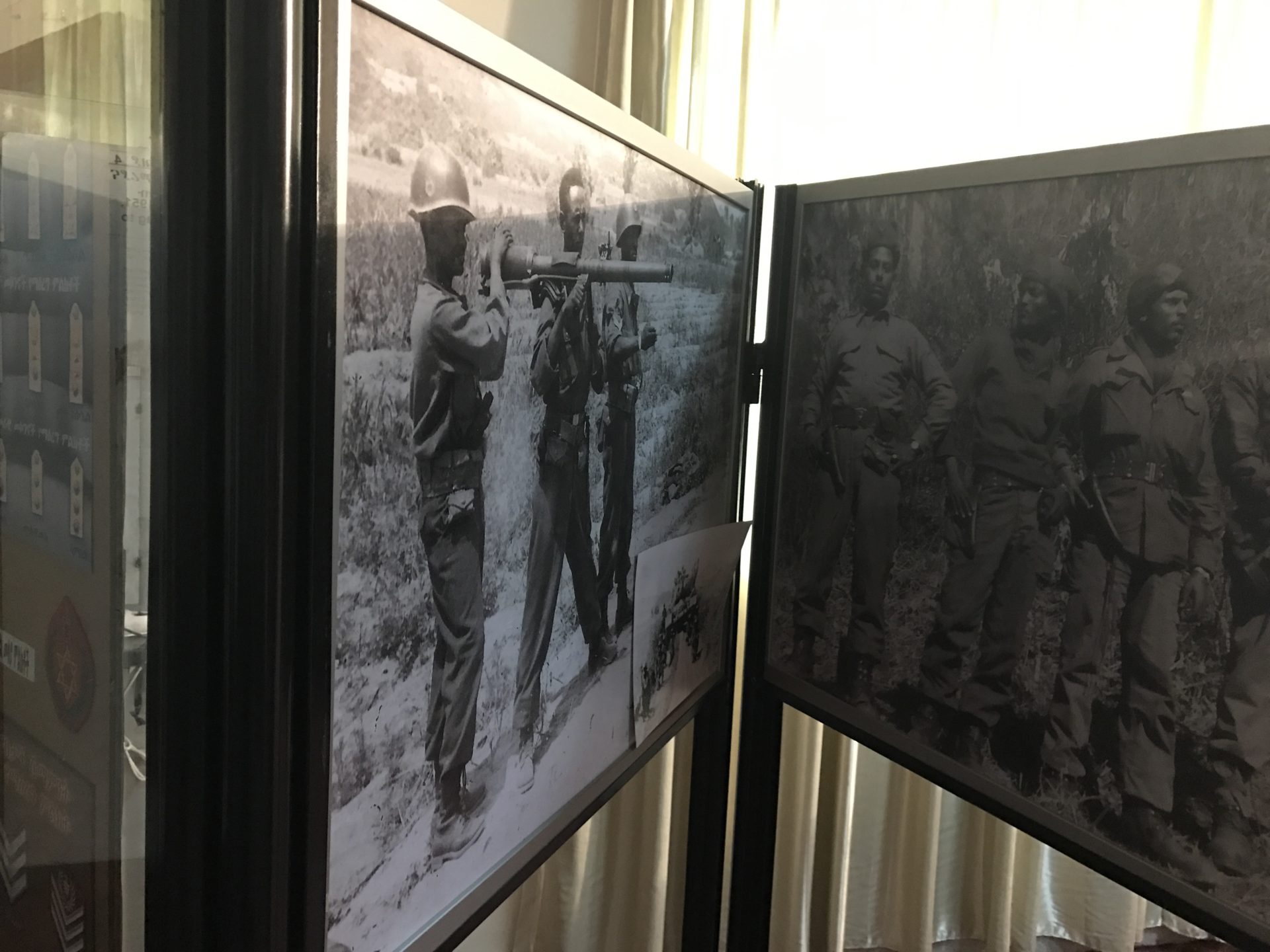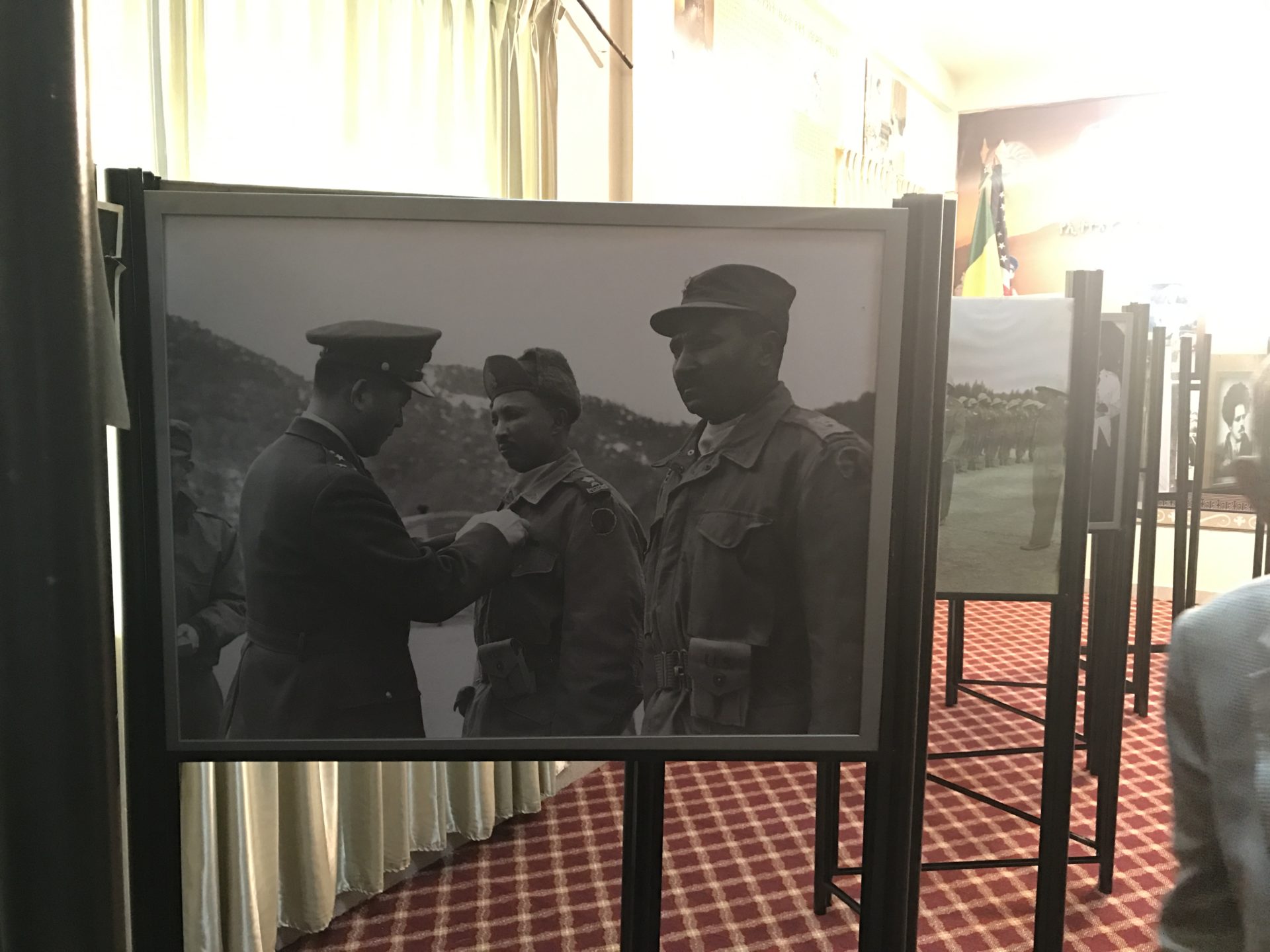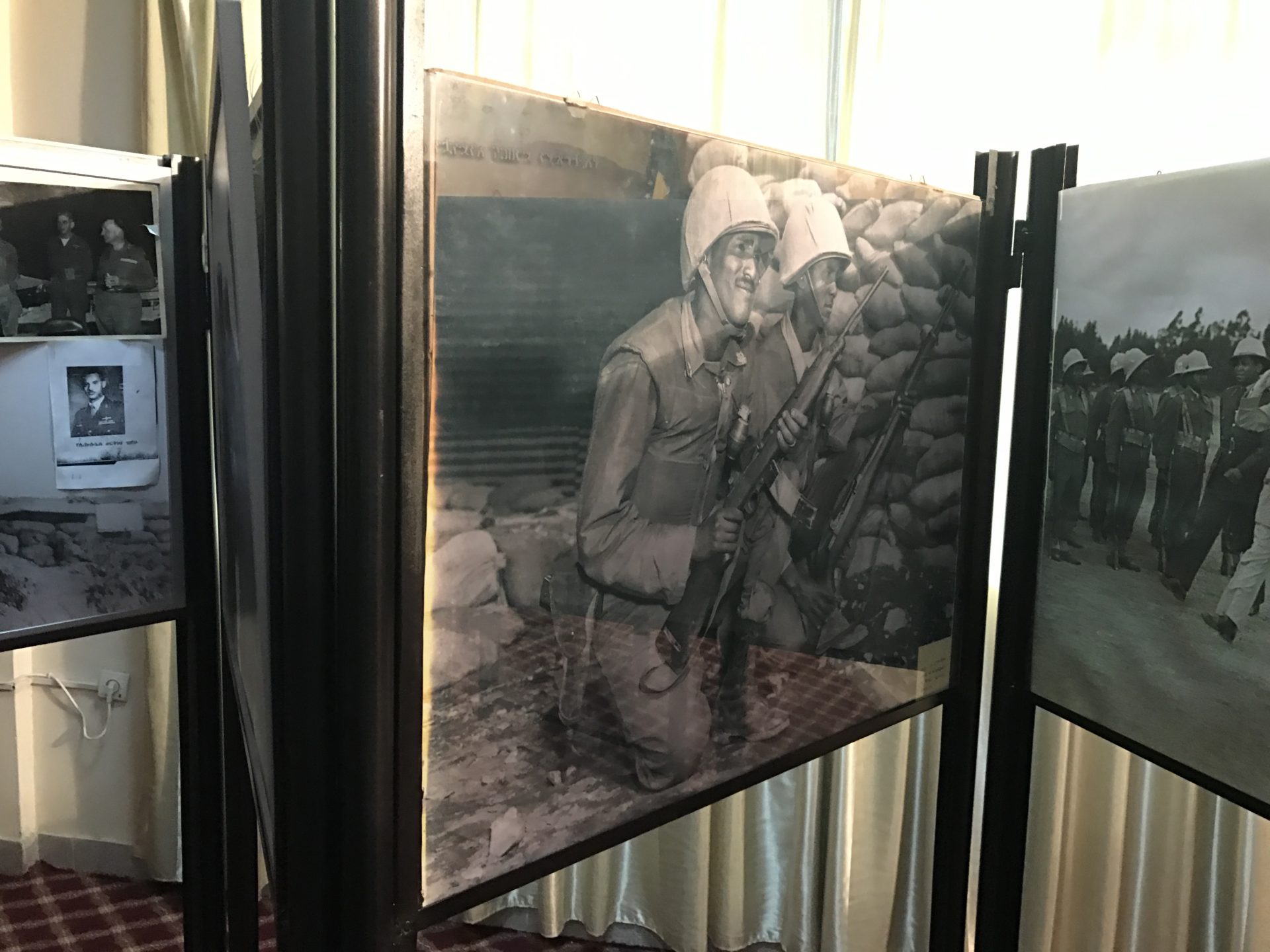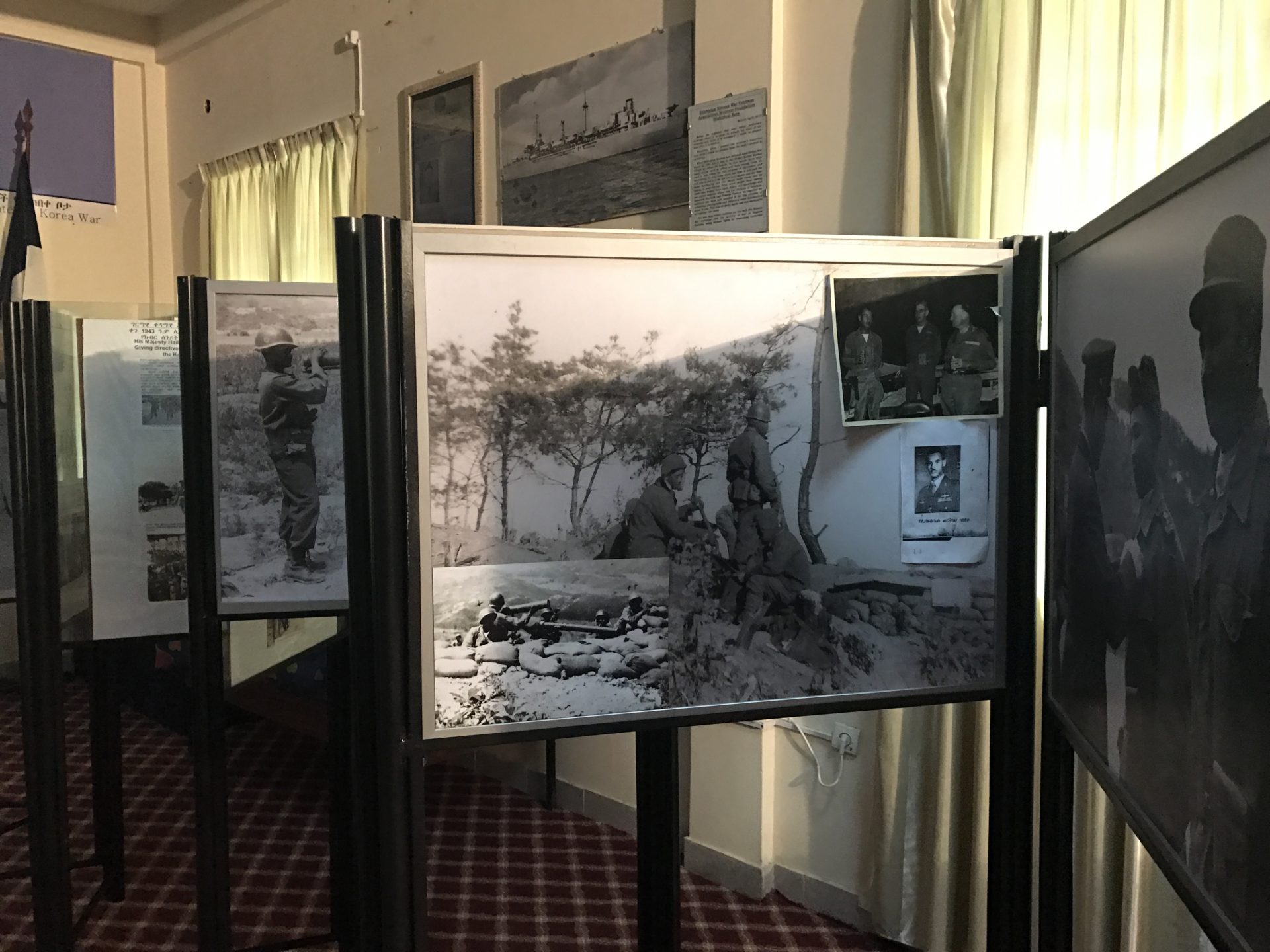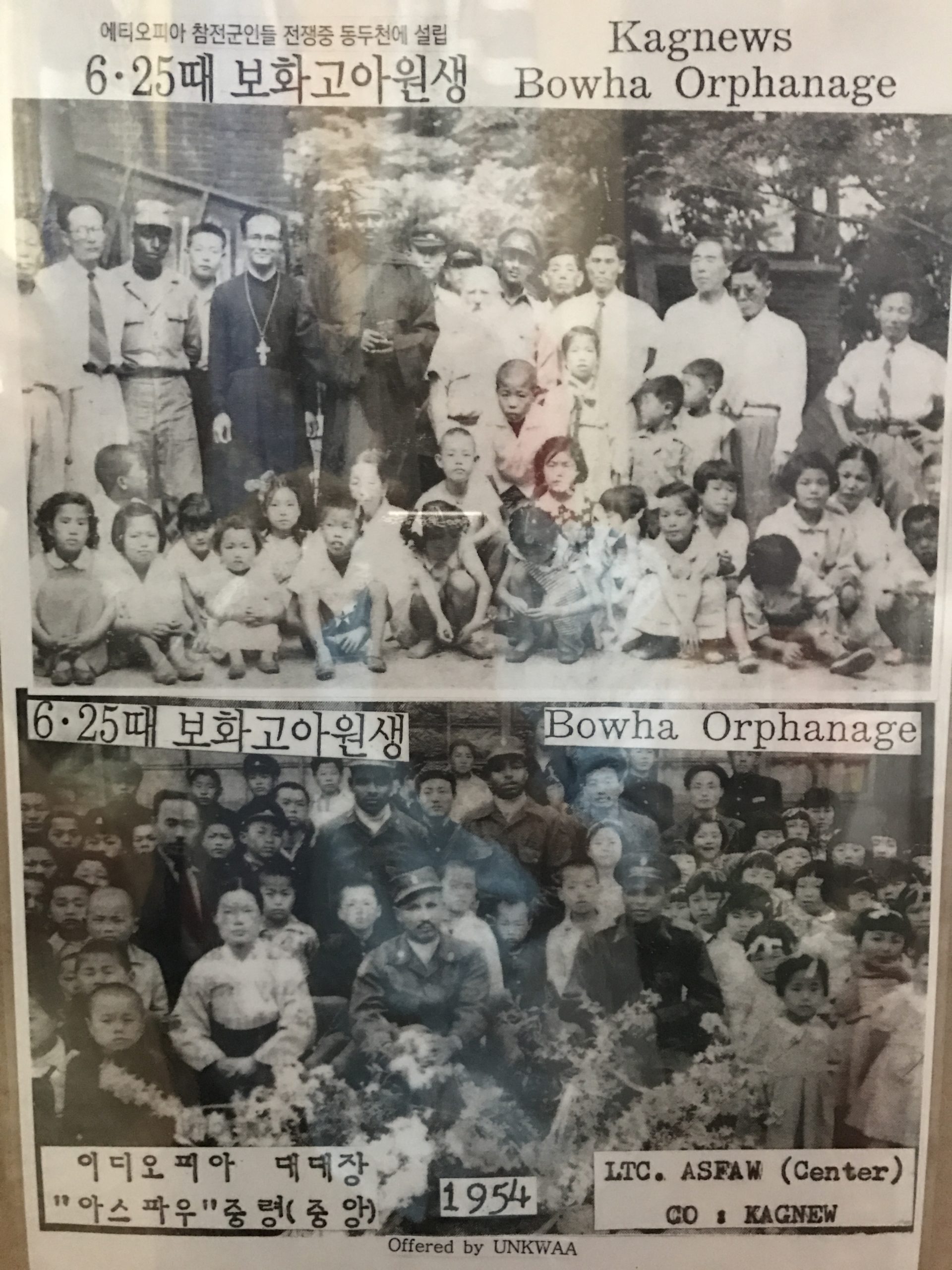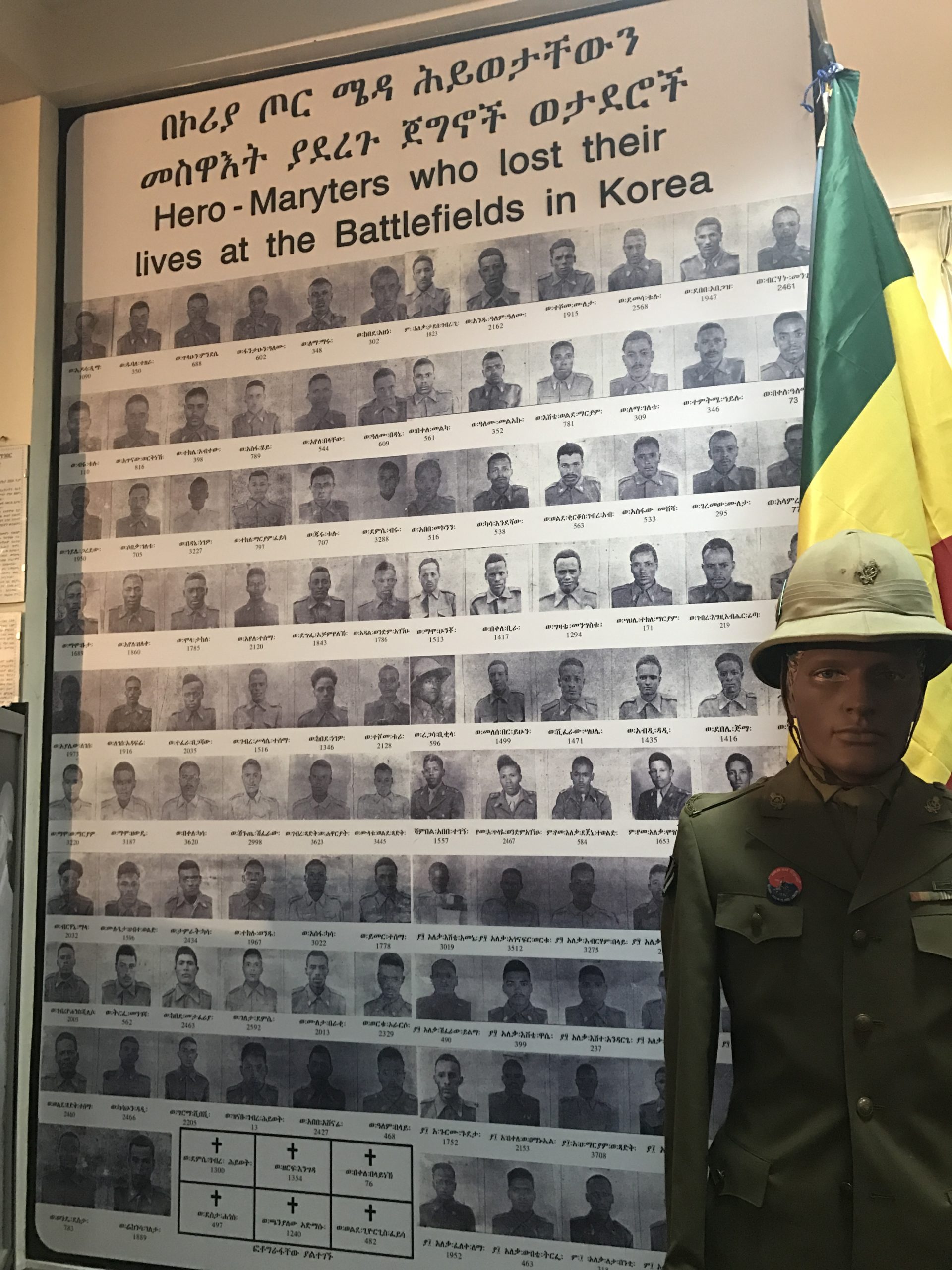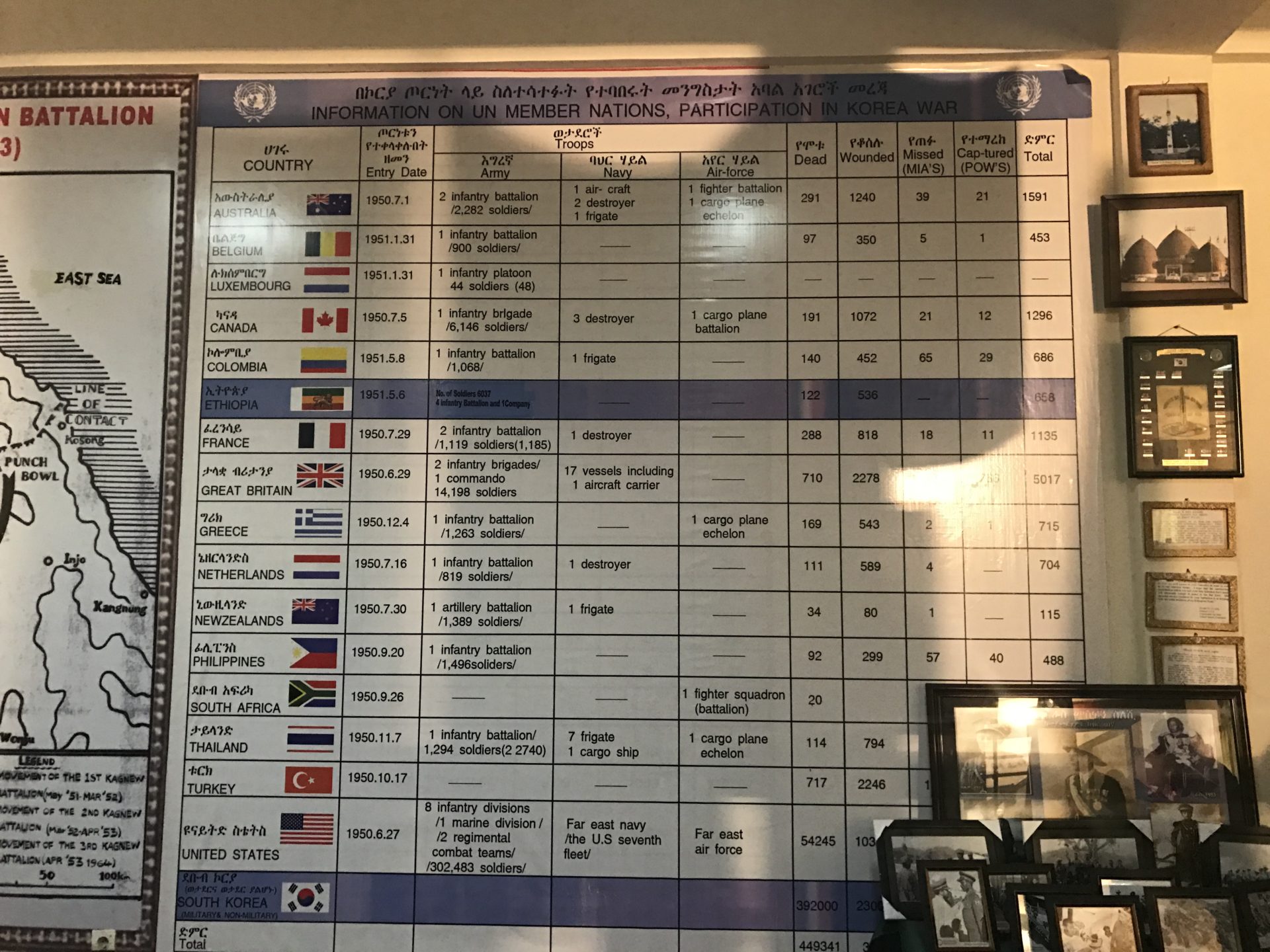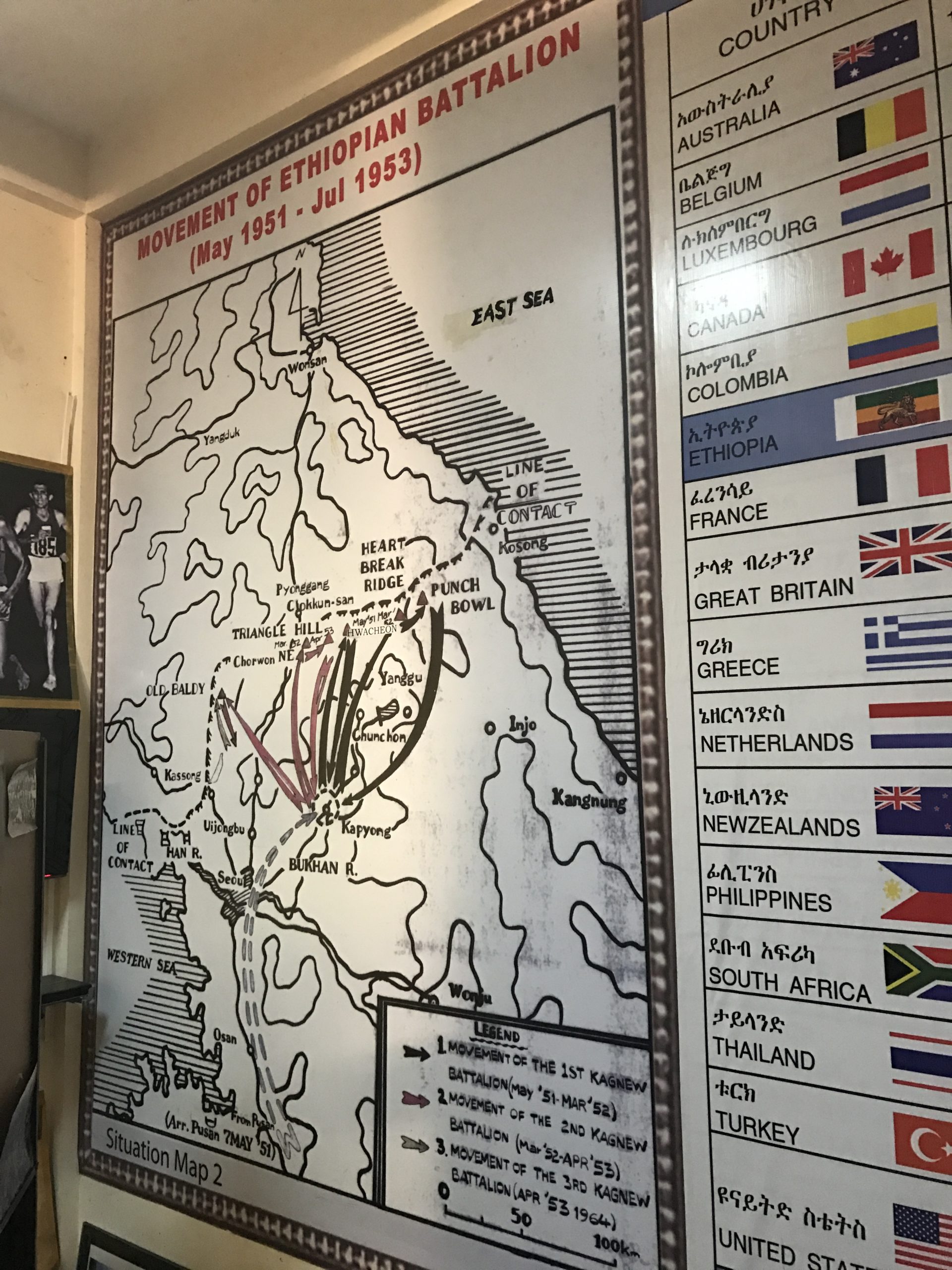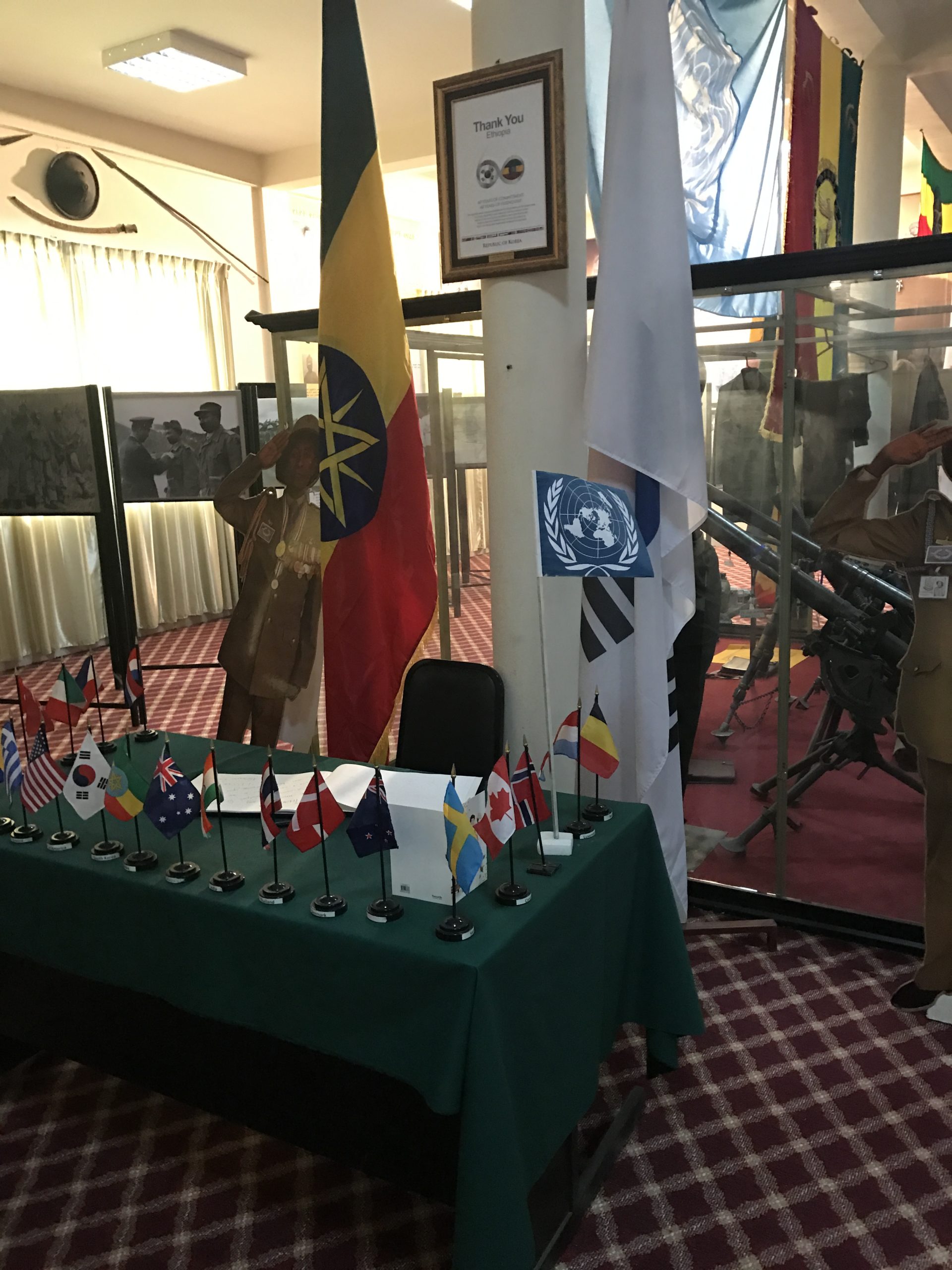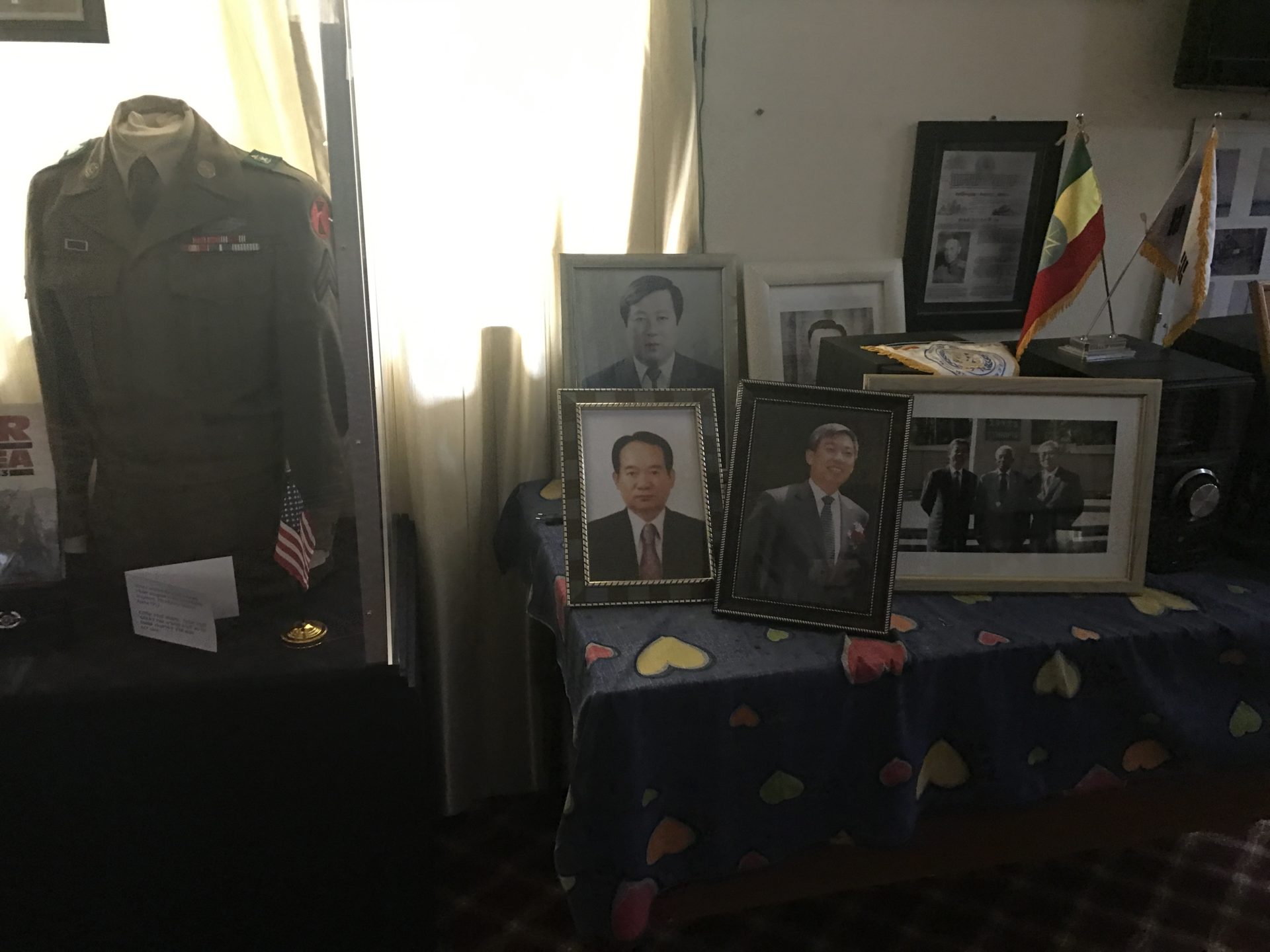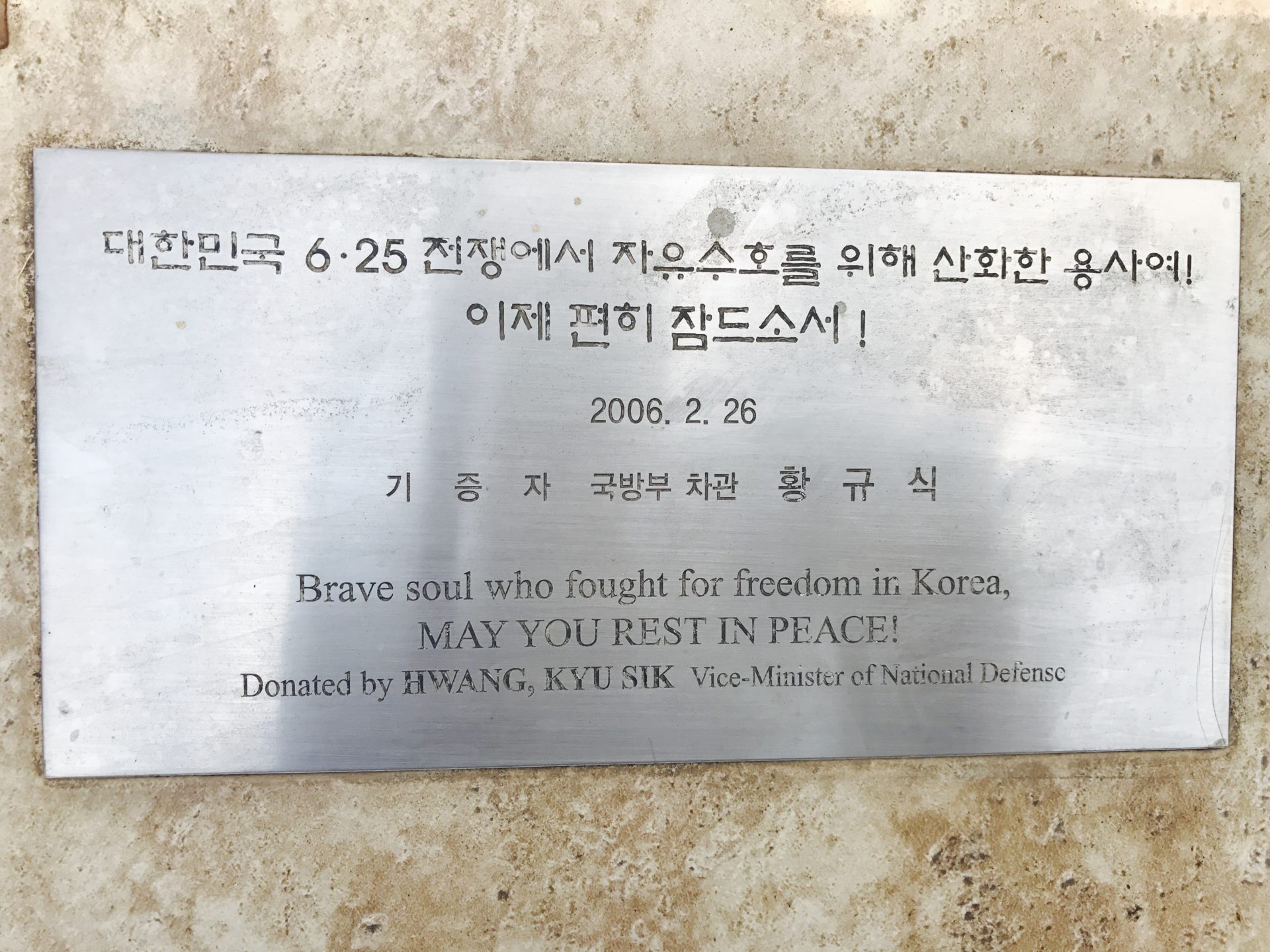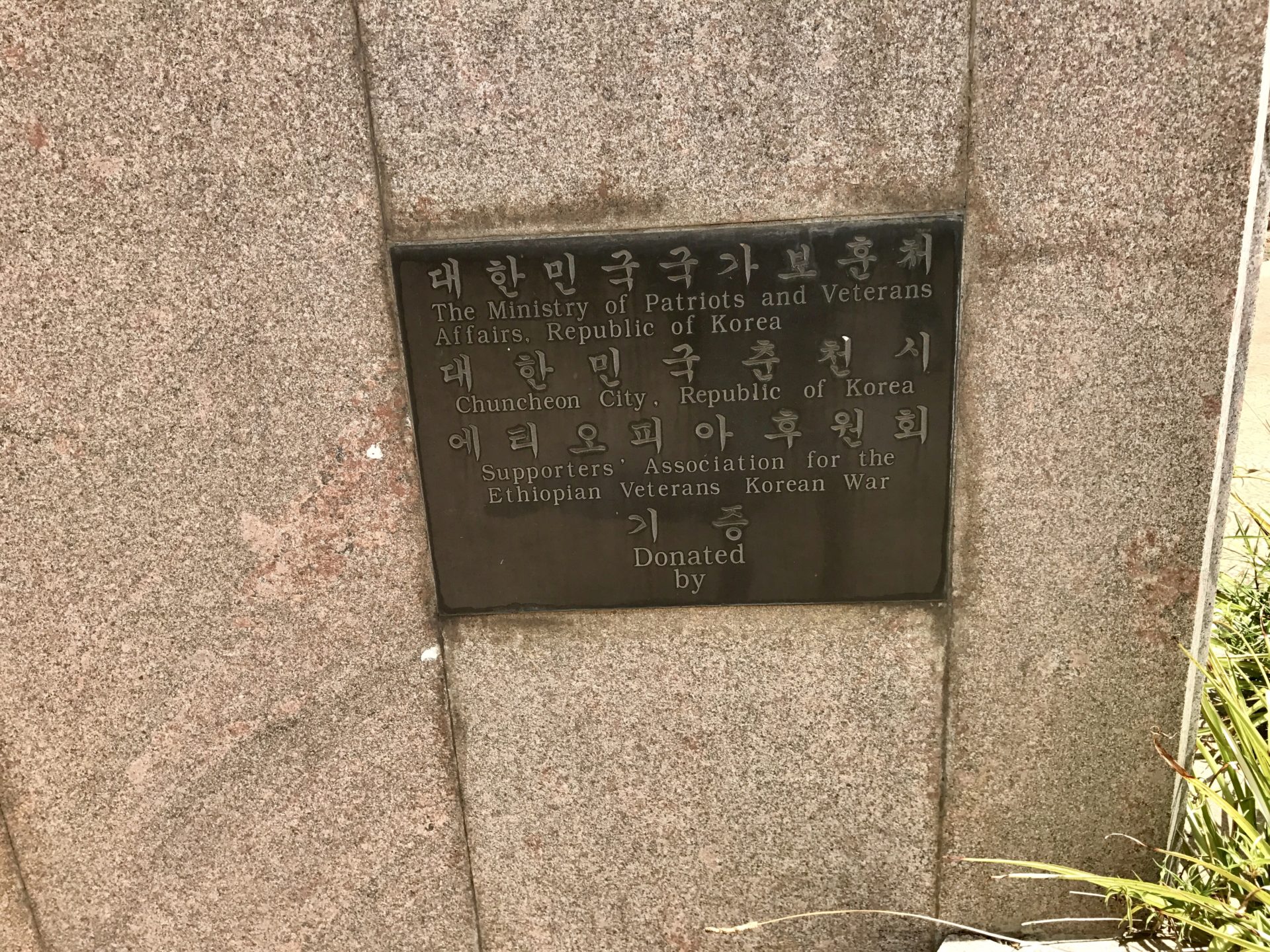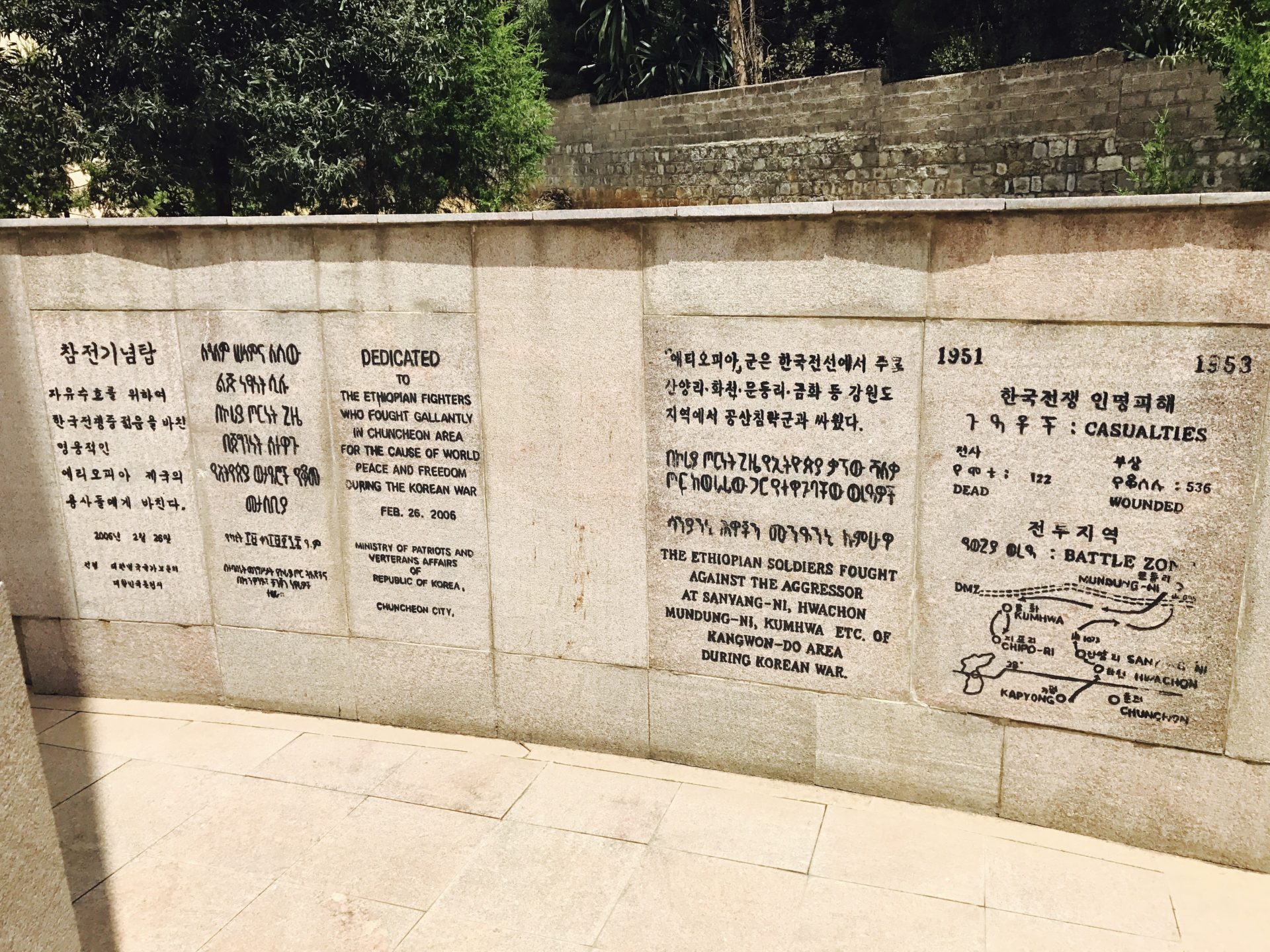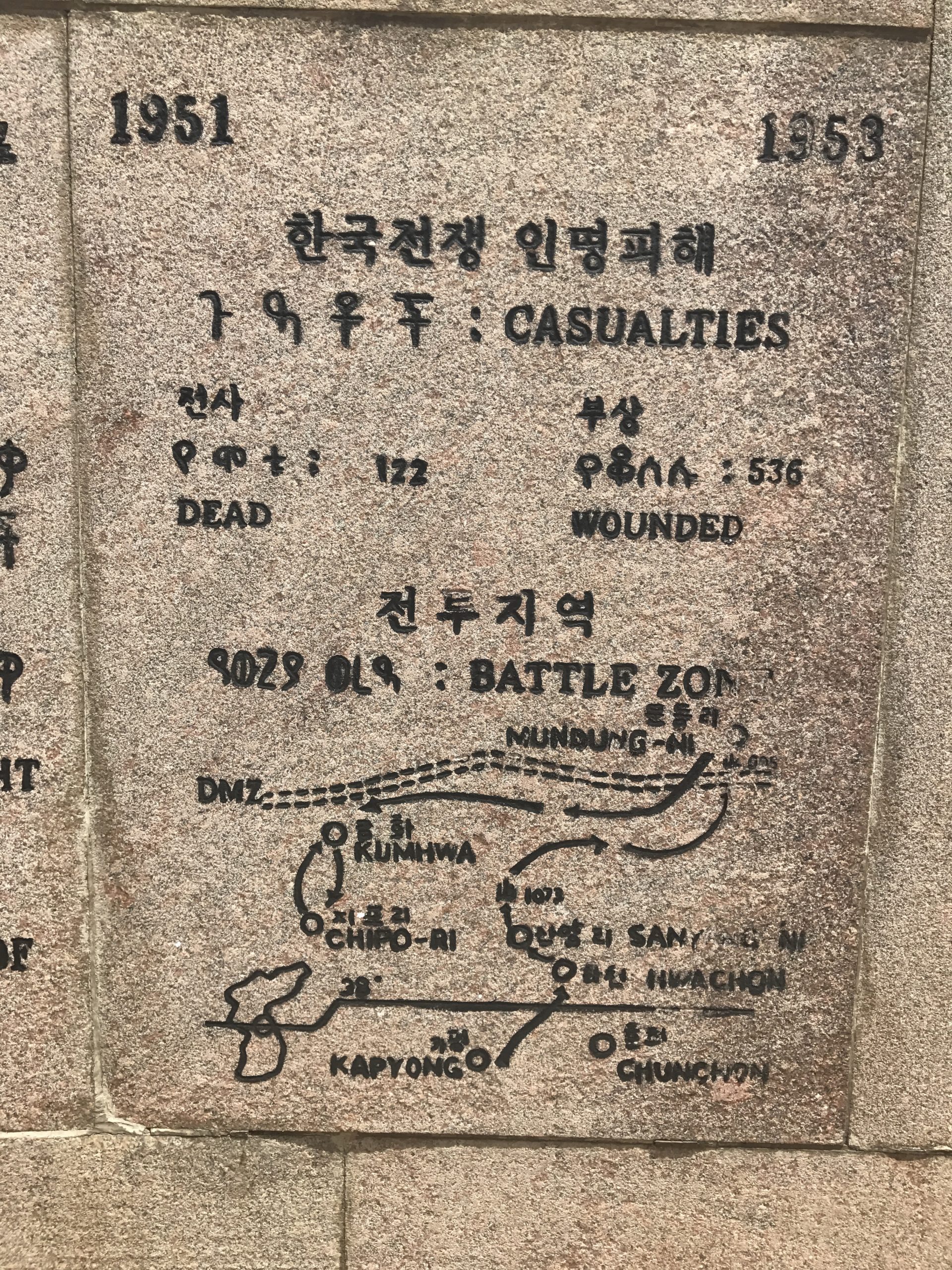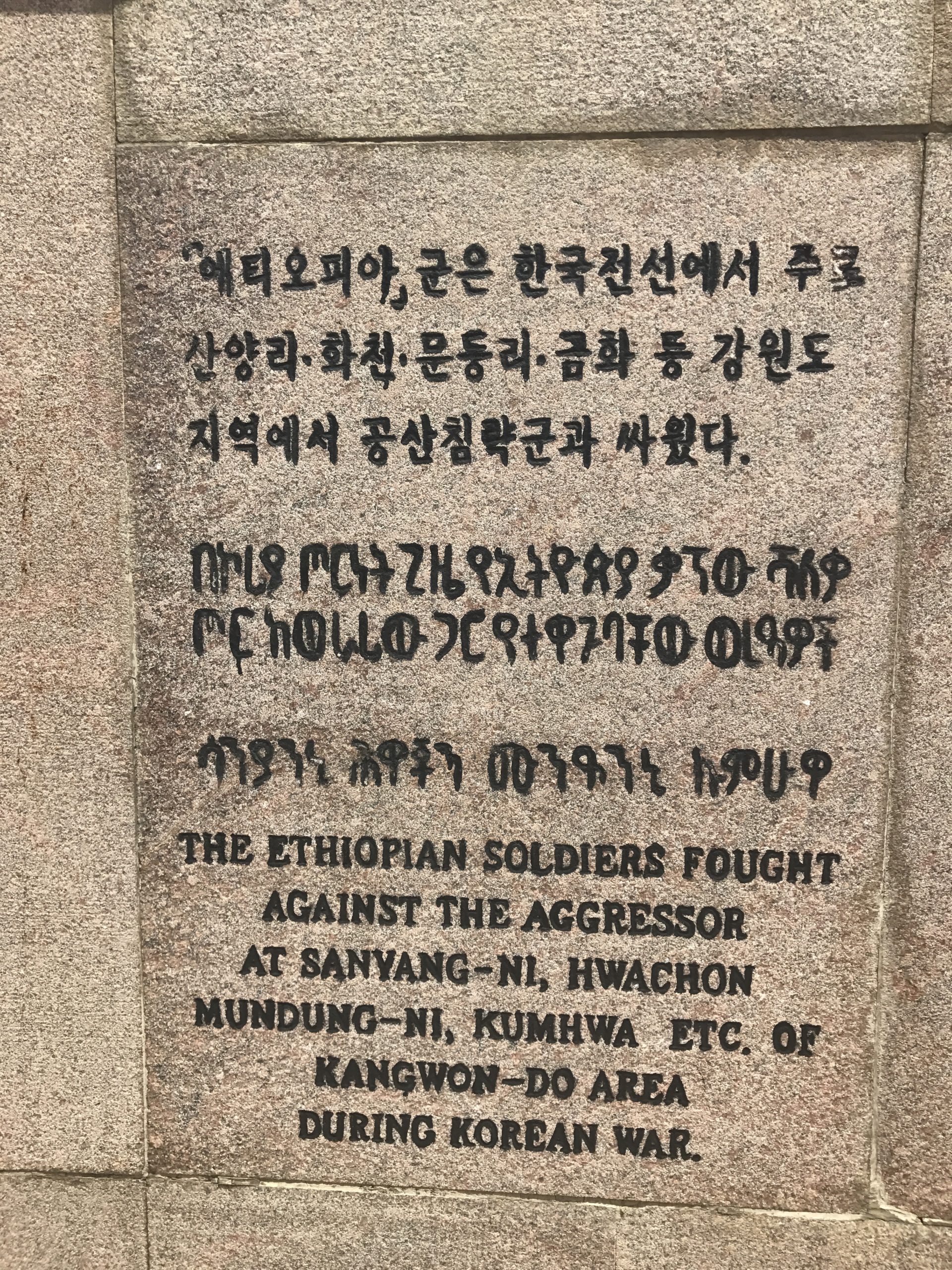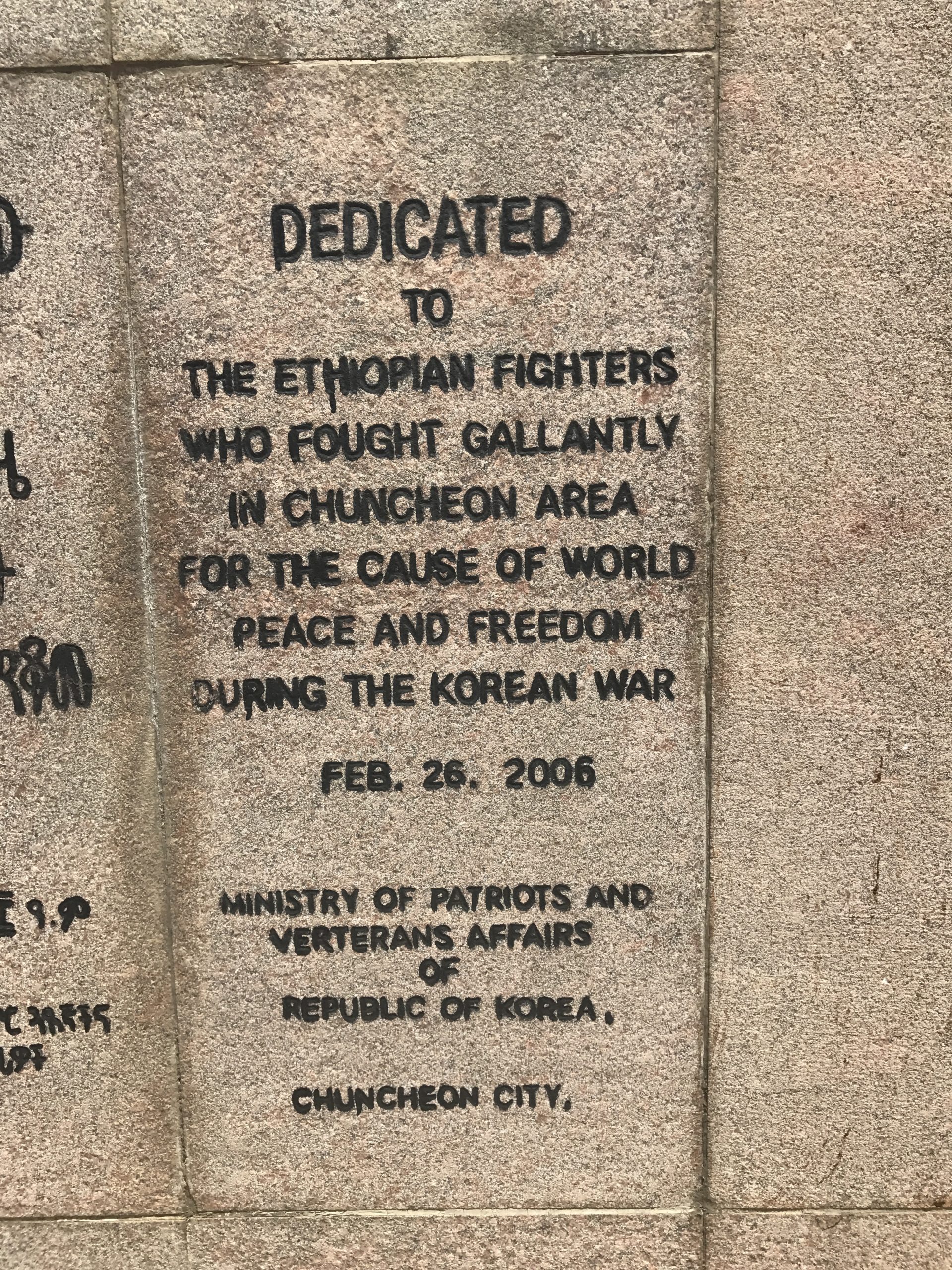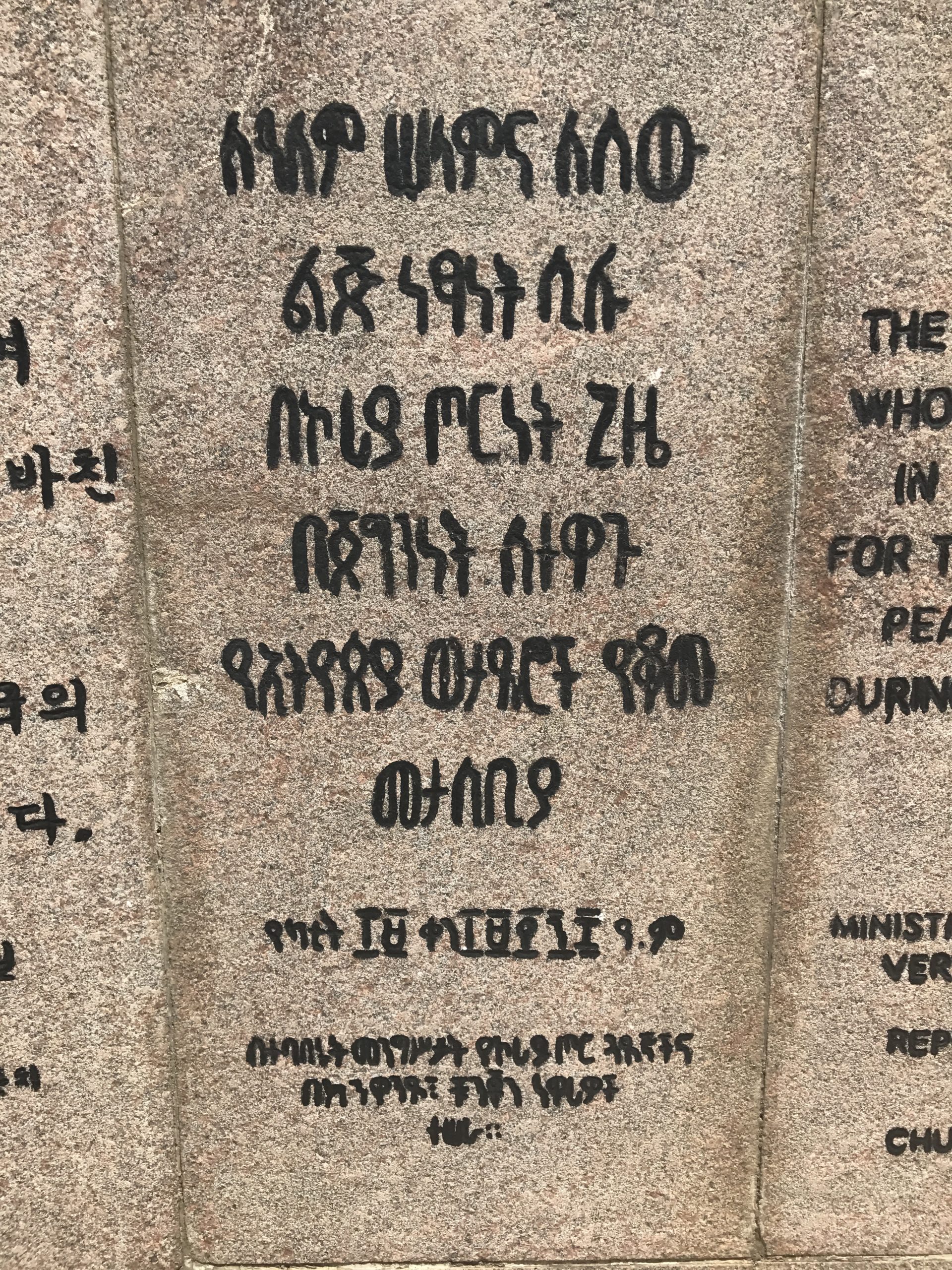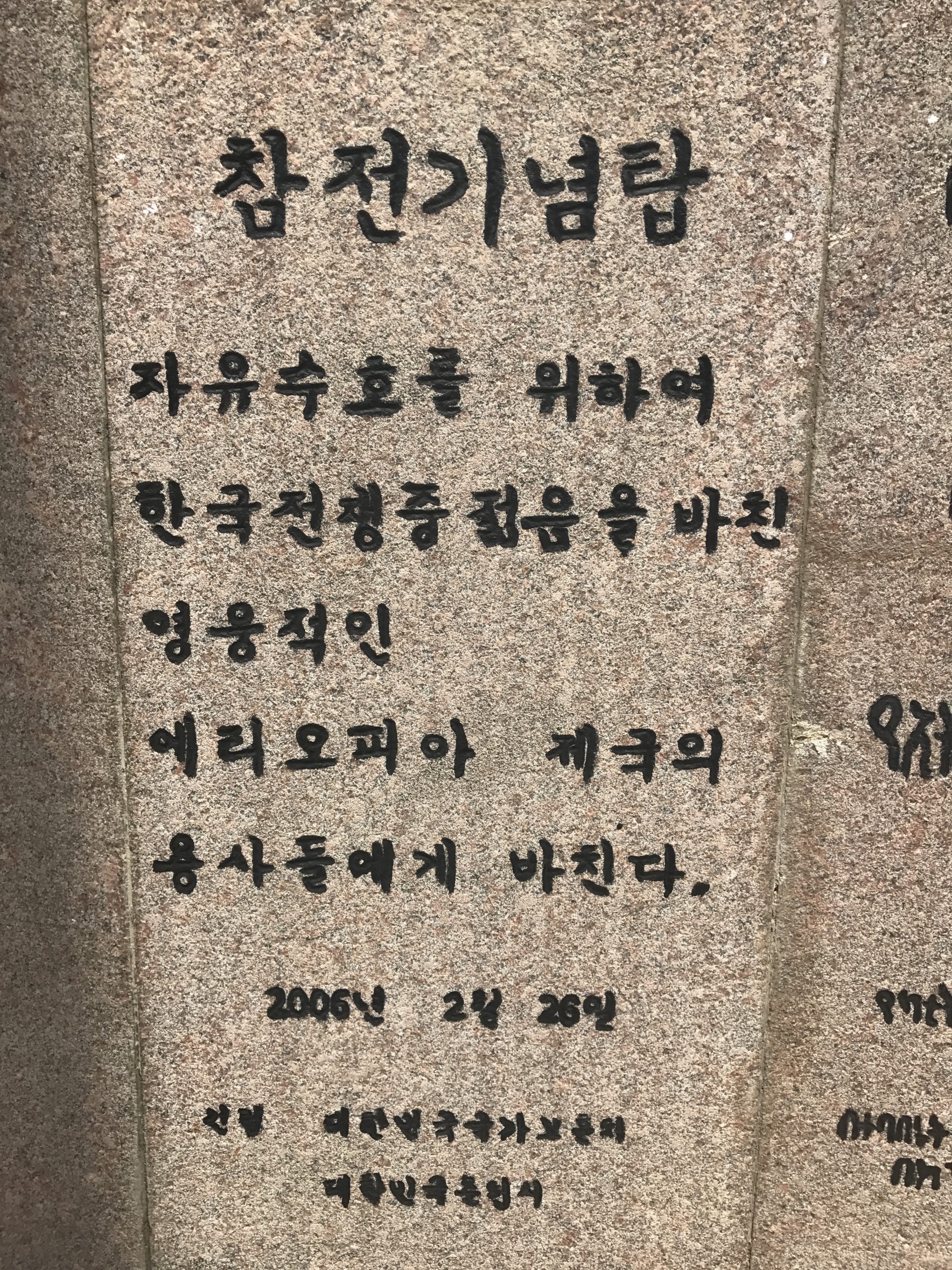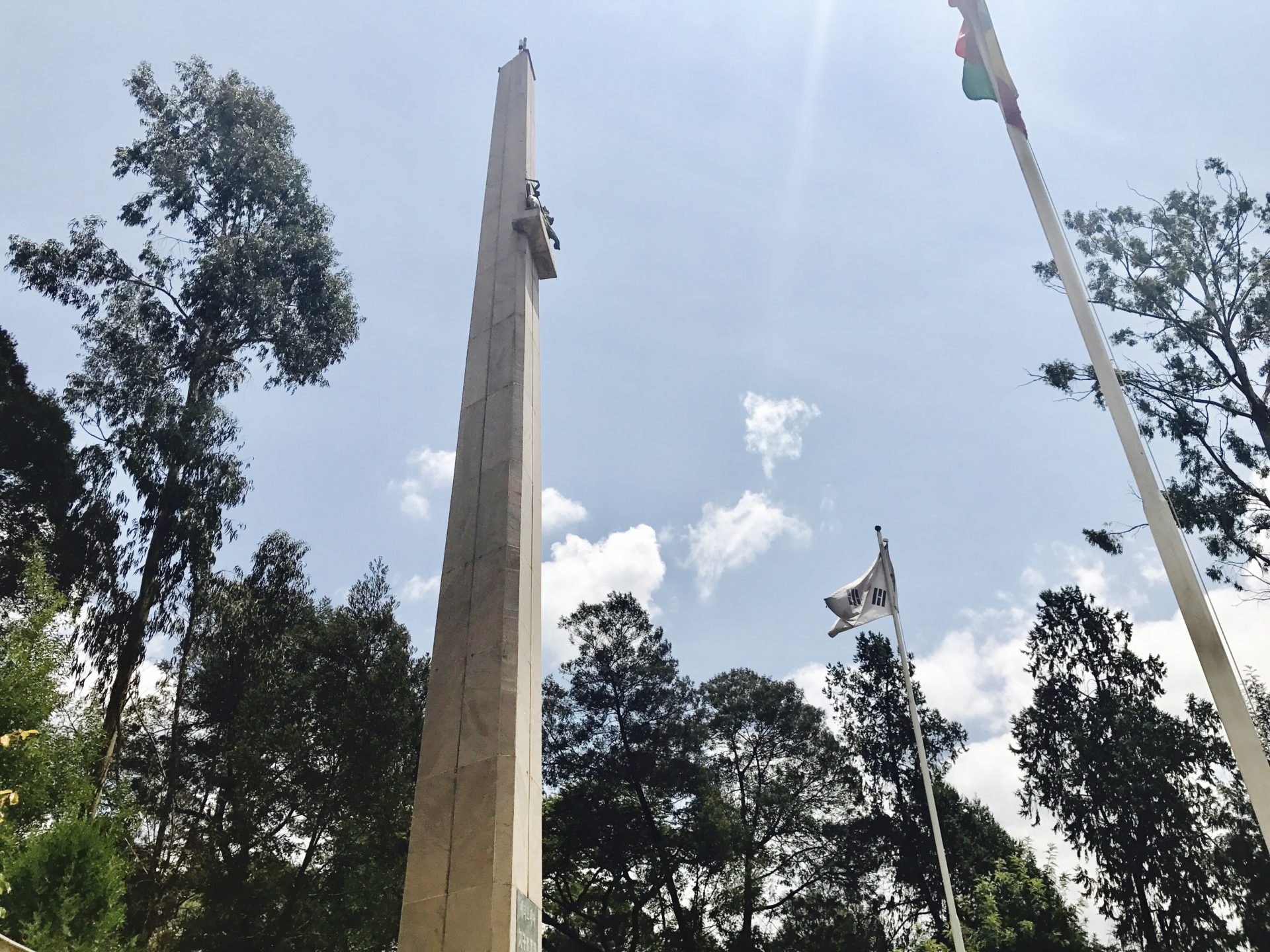Veteran Stories
>> Okay. My name is Burkanesh. I went to Korea with the Third Battalion of Ethiopia to Korea to help the wounded soldiers and general soldiers. It's not only for Ethiopians but for the whole United Nation, wounded soldiers, and then I stayed in Korea only in Korea about 5 months, and then I went to Tokyo because there were big hospital there for wounded soldiers for 1 year informant, and it was [INAUDIBLE] so we were from many country as I told you before, from America, from England, from Belgium, from Greek and from everywhere, and we used to work together in team, and whenever it was needed, whenever it's needed, they call us from everywhere. There were two hospitals, main hospital and annex hospital. When they need our help, they're calling us. They page us, and they send this motor pool car and went wherever we are needed, and it was so.
>> How many Ethiopian nurses went to Korea?
>> We were only two, Sister Esther Ayana and me.
>> Hmm. Did you volunteer to go?
>> Yes, we were volunteers.
>> Why did you volunteer?
>> We just want to help the soldiers, and at that time, world is so strange for everybody, and we were eager to see the world.
>> Because at that time, there were not many women nurses.
>> No, we were only nine who were graduating from Red Cross. We were only nine, and they asked us, "Who is volunteer?" Everybody raised the hand and Sister Studer, she chose only two of us.
>> Wow, so they didn't take all volunteers. They chose you.
>> Yeah.
>> Why did they choose you?
>> "Who wants to go to Korea?" they said.
>> Yeah.
>> We raised out.
>> But they chose you.
>> Yeah.
>> Because you had high marks?
>> I don't know really.
>> Whoa.
>> In fact, I was the second from school. Anyway, I don't know why, how she chose us.
>> When you went to Korea, did you see Koreans?
>> Yes.
>> You did?
>> Yeah.
>> You treated ...
>> I've seen Koreans, and I have seen Korea, I mean Pusan, Seoul, and it was terrible really to see. It was very sad. Many nice buildings were falling down during the war. The war just destroyed the country, and what I never forget is, there was one Korean man. Everything is plain, nothing, no house, nothing. It was in Pusan, and he put two things, these wooden for his shelter. He was sitting there, and he was sewing shoes. I never forget it.
>> Yeah.
>> It's ...
>> They were very poor.
>> Yeah, yeah.
>> But now it's different.
>> I know. I know now it's very different. I heard so, and my husband has been twice in Korea. Once?
>> Once.
>> Once, once, he was in Korea.
>> When? I guess 3 or 4 years ago.
>> Oh, very different, tall buildings.
>> Yeah.
>> Yes.
>> He said it is different, completely different.
>> You didn't go though?
>> No, after that, I didn't go. They invited me to go, and unfortunately, he was sick. I couldn't leave him alone here.
>> Well, you can still go. You can still go.
>> Yeah.
>> Yeah.
>> Can you explain to us about the medals?
>> This is a medal, what I have got. This is from United Nation.
>> Mm-hmm, show on the camera. Show here.
>> Most of it from United Nation, and this is from my government, and this is from my government, and this is from my government.
>> You're wearing it.
>> Yeah.
>> You're wearing it.
>> And this is from Korea.
>> Yes, so you must have the most medals among any Ethiopian woman, huh?
>> Yes.
>> Yes.
>> Yes, I guess so.
>> Yeah, I think so. I think so. You must be very proud. Wasn't it very difficult because you were a woman and it's war and there's ...
>> And this is from Swiss, from International Red Cross.
>> Red Cross, mm-hmm, but wasn't it very difficult, being in a foreign country. Everybody, most people ...
>> We were young, and so we were young at that time. We don't care, and we are not afraid. We're just going wherever the soldiers are, and there was temporary cleaning for the wounded soldiers, and it was ... We did our best anyway. Daytime, it's peaceful, nothing, but in the evening, starting from 6, they started fighting.
>> Really?
>> When we were asleep, yeah.
>> Really? I didn't know they fought at night.
>> They fought [INAUDIBLE]. They [INAUDIBLE].
>> Oh, I never knew that.
>> Yeah.
>> I would think that they would fight in the day.
>> No, not the day.
>> Wow.
>> It is in the ... You see, it is in the evening, usually, starting from 6 or 5. They start at that time. They fight.
>> Do you remember maybe one specific patient?
>> A patient?
>> Mm-hmm, do you remember any patient?
>> Oh, Ethiopian, when I was in Korea, we were taking care only of the Ethiopian soldiers.
>> Mm.
>> Yeah.
>> There were 122 that died and more than 500 that were wounded.
>> Yeah.
>> Yes.
>> You mean our soldiers?
>> Mm-hmm, Ethiopia, yes.
>> Yeah, yeah, but only they die, about 110 or 105.
>> A hundred twenty-two, 122.
>> Yeah.
>> Yes, but they were one of the best soldiers. They never gave up.
>> No, they never gave up.
>> Yes.
>> They never, never. They never [INAUDIBLE] never take our soldiers, never.
>> So tell us a little bit about how you met the general after the war.
>> Well ...
>> Everybody loves a love story, yeah.
>> I met him in Ethiopia.
>> Mm-hmm.
>> His sister was a nursing school student.
>> Mm-hmm.
>> And she was a friend of mine. That's how we met.
>> Hmm, and you both knew that you went to Korea?
>> Yes.
>> Hmm, that's why you ...
>> When ...
>> ... maybe connected?
>> He, you see, when I was 4 years, he went to Korea in the first Battalion, and then I don't know how long they stayed, and he came back, and when I was [INAUDIBLE] for my school, and he was the one instructing and telling us how to prevent yourself by shooting this and that.
>> Self-protection in case something happened.
>> And he was the one who was giving us training.
>> Mm-hmm.
>> Just training, huh?
>> So how old were you when you went to Korea?
>> How what?
>> How old?
>> Mid 20.
>> Twenty.
>> When I was 21, I married.
>> Hmm.
>> Yeah.
>> Hmm.
>> We were very young when we go to nursing school, very young, and we were the first nurses in Ethiopia.
>> Oh.
>> Yeah, the first. There was no one else in Ethiopia at that time.
>> Oh.
>> And, of course, there was princess. She was a nurse. She was a princess, and she took her training in England. She was the first one, and we were.
>> Wow, that's amazing.
>> Yeah.
>> So now there are many nurses, and so you are like the godmother, yeah, of Ethiopian nurses. Wow that is wonderful. What an honor to meet you, and I hope that you would also be able to go to Korea to see that your contributions and sacrifices made Korea what it is today.
>> Thank you.
>> Thank you. Thank you so much for your service, yeah.
>> My name is Derstin Germadell. When I went to Korea, I was [INAUDIBLE] but now [INAUDIBLE] at this time. I went to Korea because of the United Nations. Our government is believing [INAUDIBLE] collective, and by that time, the Koreans run by North Korea. So at that time, we are in the United Nations. So at that time, our governments were voluntary to send troops to fight with the United Nations. At that time, I was Battle Commander, and it's his first time for us to go to foreign country. At that time, we didn't know Korean areas or the ways or anything like that, but the first time our government, they gave us some orientation about the North Korean, and then, of course, we went by ship, and they went to Busan first time. At that time, we met the president of Sint Maarten. We saw General Cobedacabre that time, the continent commander. Then at that time, we didn't know, so they brief us how to leave the area, also starting to train ourselves. The weapons is new to us, the Americans' weapons, and they would stay there in Busan for 3 months training, and now some areas where that has happened, and then after that, we went to the front line. At that time, the Americans, because we are from Africa, only we would be there. So the Americans, they asked us, "Where are you from? Where are you coming? Are you a British colony?" "No," we said, we were not a colony. [INAUDIBLE] so ... "How do you speak?" [INAUDIBLE] speak in English." We say, "Of course, we are in the school." "We all speak English." We said, "Of course, we are in this school," and we learned English. Especially our officers, they are trained in the academy, of course. So everybody knows, it's not a problem for us, the language. So we start up to front line, and then at that time, they don't believe us because they are afraid if the Koreans, North Koreans or Chinese break the line, they came from behind. So they sent us first but accompanied by a platoon, a floater attached to the company of Americans. Then at that time, the first time I went to the one company attached to the Americans at the front line, and then the company commander gave us a mission to go forward and to see, at that time, there is no [INAUDIBLE] front line. The mission that he gave us to do, to bring president or so to destroy enemy bunkers. "So this mission will be you starting tomorrow morning," and then he also attached, was one, [FOREIGN LANGUAGE] six, seven people with us, Americans, and then in the morning, I started to go to that area, especially [INAUDIBLE] we know how to read the map, the area, the hill, the river, everything we could read already. So he told me to go this place and try to bring president. So I went, but some time after I start in the morning, there is clouds. I can't see 10 meters even, and then I report to company commander. He said, "Stop, stay there. I'll inform you when the clouds go. You can go to your mission." After 1/2 an hour, the cloud is off. Then I went. I told him, "I can see now." So it was about 2, 3 kilometers from the company areas. I went to the front, and then I stayed there, and then I observed by my ...
>> Binocular.
>> And so there is an enemy bunker in front I can see. Unfortunately, one Chinese soldier came out from the bunker, and he tried to go to the river. There is some river, and I now have an opportunity to take him easily. So I turned to my squadron commander [INAUDIBLE] FR, and he took slips just with him, and he went down, and then the soldiers, he tried to take the water from the river, and then they captured him, take back, and then I reported to the company commander, and he said, "Please send him immediately," and then I came back to this area, and then he gave me orders again. "Now try to destroy the bunker." "Yes, I can see the bunker." It's about a 100 meters, something like that, from my place. So I have set of 75 millimeters. Also we put out machines and then shoot them. I report I did all these things, and they told me that, "Is it possible to go to that area and bring some peoples if you can?" "Yes, I can." He changed his mind again. "Please can you hold them there? I will give you artillery to bombard the area over there." So, "Yes," I told him I'd ring him up, and then he understand, and he knows where I am under the [INAUDIBLE] three round. So I destroyed the area, and then he say, "Come back. That's enough. So I tried to go back, and as we started walking up again back, it's about 400 meters, something like that, the enemies, they realize that we are there, and, from left and right, they started shooting. Anyhow, this jungle area, as we went back safely without anything or any prisoners at that time, but unfortunately, on the front line before me in some areas, they took one prisoner. So they promised us to send someone for vacation and something like that, but unfortunately somebody was before me. So I lost my chance at that time. So after 3 or 4 days with the company there, and then I went back to my unit. This is the first time I did my tour. Now this time, the Americans, they saw us, that we are very good soldiers, and that we are brave. So we starting with company size in the front line, and then from the front line, we start to go with the company, fighting on the frontline zone. So we did that so they'd believe in us, [INAUDIBLE] everything with them. So we went with the battalion first on the front line and then, starting with the company, fighting in some areas. So we did a lot of ... We win a lot, and then we [INAUDIBLE].
>> Mm-hmm. I read that you never lost a battle. You had about 263 combats but never lost a battle.
>> No.
>> That's amazing.
>> That's so amazing.
>> That's really amazing, and that ...
>> No prisoners, no even ...
>> Dead, dead.
>> ... dead men.
>> I know.
>> Yeah.
>> That's amazing.
>> Yeah, because always after fighting, we controlled our people and where they are. Of course, sometimes, we are in the bush and something. So we'd find them and take them back, yeah.
>> Mm. So later, after the Korean War, you stayed in the military, and you eventually retired as a general, right? And you fought in Congo, and after, you saw other conflicts, but what do you think is the significance of the Korean War in terms of Ethiopia's military actions?
>> You see, there is a different unity there, especially French units in some areas, and then sometimes, there are lots of their soldiers and so on. Then we go to the front line, of course, in that area. As of that time, of course, the Americans, as I told you, we are moving on us, and so we are a diverse battalion, [INAUDIBLE] battalion, and then sometimes after we stay there on the front line, we go back to rest. So at that time, we meet a lot of [INAUDIBLE] from another continent. Is that not answer for you?
>> Ah, no, no, no, no. So Ethiopians, do they know about the Korean War? Are they proud of the Korean War, Ethiopians in general?
>> Are they proud of it? That's ...
>> Ethiopians, do they know about Korean War?
>> Yeah.
>> They do?
>> Yeah, they know, for example that our officers [INAUDIBLE] before 10 years after, 20 years, and now some of them coming together and so on, and we had a lot of experience at that time, and then, for example, you see, the Korean people, they are really with us. They are good to us, I can say. At that time, as my wife told you, when we went to Korea, the area and the people is very, very, very low and very poor. If you knew [INAUDIBLE] at that time, but now, I was there 3 years ago, and so the area was bombed, and now woods ... Everything is ... Only at that time, but now the place is industry. Where we are fighting, it's been [INAUDIBLE]. It's amazing to see these people. So even we learned enough from them, from Korean people. We know we saw, at that time, what they are, but now, they are completely changed. They can teach us how to be a good people and do good things.
>> Well, I want to let you know that the rise of Korea from the ashes of war, it is actually thanks to your contributions. I read that Ethiopians were, again, one of the best fighters, and that the enemy saw blacks for the first time, and they thought you were superhuman because you had a reputation for being so brave and best soldiers, and I thought that was very funny. Can you explain to us a little bit about your medal?
>> Now, for example ...
[ Chatter ]
>> See, the one thing now, what the Koreans is doing for us, really, in the hospital, free ... We are in the hospital, everything. We are not paying. You see? No. Now when I go, two times operation in a Korean hospital. Yeah, I'm not paying, nothing. Medicine is free. Operation, everything is free for us besides this ... They are giving us pocket money every month, [INAUDIBLE]
>> Whoa.
>> You see? Now they are not forgetting us. Still if we ask them to do something for us, they do it. They never buck. They always say, "Please ask us what you want. You give us our blood, your blood, your life for our country. Now we are in this place. We are here now. So we can help you. You are our brothers because our blood is together now." You see, one Korean ... They always went out on the front line. They bring us hot food and something like that, padding, because no person is reaching there. So after he gave us this food, and, you, see, before he go back, the enemy shoots a weapon, of course, and then in the ridge, one of the ridges, they can't see them. Then this Korean hit by this, by some artillery, another artillery, and then our soldiers, they went and take him. Again, they fire. Both of them, they died, just like that. So we are blood. Even in the blood, we are together with the Korean people. So even they are good for us. Of course, we do our best to them also. Yeah.
>> Well, again, I'm very grateful, and that's why I'm here, and I call all Korean War veterans my grandpas because I say if you weren't there fighting, I wouldn't be here right now.
>> You are proud of them still now.
>> And my friends and family and supporters in America and all over the world say they want me to express gratitude on their behalf. So thank you very much, thank you.
>> So you are saying when you are asking to receive, thank you very much. Again I say, please tell our bravery to your people.
>> Thank you. Thank you. Thank you.
>> Thank you.
>> Yes, my name is Colonel Melese Tessema. I'm the Korean War Veterans Association president presently. I've been to Korea during the war, the second battalion, and the journey was very long. From Addis to Djibouti, we took train, and from there we back on the ship, American military ship named [INAUDIBLE]. Then we arrived through Pusan port. Then your previous president, Syngman Rhee, received us, and from there we went to training center. We took some training and studied weapons, and we stayed there for about 1 month under training, and we then adapted the climate, and we had been through [INAUDIBLE] with the people at that time. When I arrived to Pusan, it was my first [INAUDIBLE]. I was very sad to see demolished buildings, and I saw many children crying on the street. They lost their families, and that was very sad to see that, so we stayed in that training center for about a month. Then we went to the front line, and we had been deployed to the battlefield. We hadn't started our mission. Realizing all the war is war, there's no mercy for war. We took part, and we participated, and we joined the United Nations forces there, and we received many operation orders, so we had been fighting as a fighting patrol and ambush patrol. That was very tiresome, so then ... But the most surprising thing that ... which made our participation in the war, which made it special that Ethiopian soldiers never gave up. No war prisoner took, and we have never left behind our injured soldiers or killed in action, so that was very special going for us, so we stayed there for about a year, and then we had been replaced by another battalion, and we returned home. When we went to Korea, we received a banner, a special banner of the old leader. We received that banner from His Imperial Majesty. The troop which has been to Korea is a special bodyguard, the elite force, so that's why maybe we don't give up, and we have never lost even the front line. We never lost the ground, and we have been successfully captured our objectives very proudly, so now the time is so long. Everything is forgotten. To me, today, what surprised me, to see the Koreans to visit us after 65 years, that was very special. I consider that the Koreans has given a special consideration to our battalion and to our war veterans, and that makes me proud, and, also, we have been to Korea as I told you at the beginning. It was barren and demolished buildings. We see the children crying at the street. That Korea was a very poor country. This is the true story. I can tell you now. At that time, Ethiopia was better than Korea, but after 65 years, Korea is now among the very civilized country, and I think it is 10th or 11th developed countries now. Now that makes us proud. Not the Koreans proud of that because it is we, the Ethiopians who proud more than Koreans because we gave our lives not for nothing. Now at this time, when we see Korea developed, it is we who can be happy. Yeah, but you tell us still to all Koreans that we are more happy than the other Koreans.
>> Can you explain a little about the battalions? Why were they called the Kagnew Battalion? How many were there? How many were in each battalion? How many in total went to the war? I know even after the armistice, you stayed. Ethiopians, the battalion stayed, like, for example, Colonel [INAUDIBLE]. He went after the armistice. You know? So can you explain a little bit about this?
>> Yeah, although the Ethiopian forces had been to the battlefield about 600, more than 600, 600-something, and among this, 122 died. No prisoner at all, no lost in action, and that makes the Ethiopian force special, and as I told you, this is the elite force. We were very much trained here in Ethiopian also if we're going to Korea, so that's why our participation is very special that time. When we arrived there, we were very young officers. We went to Korea soon after our graduation. We graduated April 11th. We left for Korea April 12th or 13th like that. At that time, we were about ... Our age was between 21 and 22. I myself had been to Korea when I was 22. You can see that is my picture in the museum. When you see I'm very tiny, that's your story.
>> You were all kids, and did you all volunteer? Or were you drafted?
>> I beg your pardon?
>> Did you volunteer? Or who went?
>> Yes, yes, I can say, "Volunteer," yes. All of them are volunteer because it was very sad. The Ethiopian situation almost is the same like Korea. At the beginning of the Second World War, we had been invaded by Italians, so at that time, when we appealed to, not to the United Nations but [INAUDIBLE] organization, so at that time, His Imperial Majesty appealed to that organization. They did not give attention to his appeal, so we had been invaded by Italians, so when we had been asked or ordered to go to Korea because we are volunteer because our situation was the same like Korea, so we give priority to save lives of the illegally invaded countries and that we save lives of the oppressed people.
>> Mm-hmm, so a total of I believe 6,000 Ethiopians served from 1951 to 1964? Can you tell us a little bit about that battalion that stayed after the armistice?
>> After?
>> The armistice?
>> After armistice, yeah. After armistice, we thought we were returning home, and we started our usual work, so we returned to our unit after armistice, so in between, as you read the story, our country was overthrown. The emperor, Haile Selassie, and the communist regime was adopted, but that communist regime, we were hated by that regime because we had been fighting with the communist invaders so this communist regime, so then they hate us. They don't like to see even our face. We existed only that we were Ethiopians, so if we had been foreigners, we would have been ordered out from Ethiopia by force.
>> Yeah, so tell us about the story of the fence.
>> Oh?
>> With Grandpa Melese and the Korean soldier.
>> Melese?
>> And the Korean soldier.
>> Uh-huh.
>> Tell us that story.
>> Well, really, accidentally, I had been alongside with the Korean outpost. I was from the right side, and from the left side was the Korean outpost. They were brave fighters, really. Even I admired them. They were brave fighters. They were never afraid. They would never retreat, and I saw them, and we were very close to each other, so I saw them. They were very brave fighters because they are defending their country. They are giving their life for their country. Therefore they are giving their life for their independence. Therefore maybe that's why they are best fighters.
>> Oh, no, tell us the story about the fence.
>> The fence?
>> Yes.
>> What fence?
>> The blood brother, the blood.
>> Okay, you know what happened there once upon a time? The Korean service team came at the front line to strengthen the front line, their defense line, so they were fencing with barbed wire to strengthen the front line, so at that time, they were fencing during the night, so at that time, the enemy heard the noise when they hammer. Then they fired the mortar fire, and that was the fire exploded among the Korean service team, and this explosion killed some of the Koreans and injured some of them also. The injured ones were shouting, asking for help, so the Ethiopian soldiers went out from their defensive position, and they tried to save the lives of those injured or before dying to give aid, so that time, it was only the Ethiopian soldiers went out from their defensive position from the bunker and tried to save the lives of the injured Koreans, so the second round came and exploded, but one of the Ethiopian soldiers, who carried the Korean, the wounded Korean, the second explosion killed both grasping each other, and they died together, and probably they were also graved in the same coffin, maybe, yeah.
>> Mm-hmm.
>> This is now we ... Our relationship between Korea and Ethiopia is not like others. We have a blood relationship. We use this word. Still we use, and even we use forever.
>> Mm-hmm, yeah, so that's why you're my grandpa.
>> Mm-hmm.
>> Yes, thank you so much.
>> That's the story of our ... His name is Melese. He's bearing my name.
>> We saw. We saw the grave, yes.
>> Melese [INAUDIBLE].
>> What was the name of the Korean?
>> Really, it is difficult for me, and even now I cannot call the name of the Korean since it's too difficult.
>> Yes, and you returned, you said, to Korea, so can we talk about your role as the president of the Veterans Association? What do you do? How often do the veterans meet? When was the memorial built? You know? Can you share?
>> It's not clear for me, your question.
>> You're the president of association.
>> Yes.
>> What does the association do? How many members are there? How often do you meet? You know? There's a memorial. Right? And the park, when was it built? I think the Korean government donated. Right? So can you share with us that information?
>> You know, the story of our association, our association has been established in 1931, I think.
>> '31? After the war.
>> After the war, yes. It is after the war, yeah.
>> 1961.
>> Our association established after the war ...
>> Yeah, so '60.
>> ... because during the communist regime, we cannot establish, and we are never established because we have been refused to establish our association, so after this government came, they permitted us to establish our association.
>> What year?
>> Well, about 24, 25 years ago, we have established our association, and now I'm the second president of our association. Since I have been elected, it is now 7 years since since my election, so within 7 years, you know, our association is built just to help each other and to maintain the story of the Korean War and the relation between Korea and Ethiopia, so now we are doing that. Within this period, we received ... After we had established our association, many Koreans came and visited us. During this time, they gave us a lot of help because during the communist regime, we could not do anything. We were very poor, as you know, and even not only us, but also Ethiopia due to drought, we became very poor and were in very catastrophic condition. So even though it is worse for Korean veterans, so all the country was under poverty at that time, so they were better than ever, so now since we established our association, as you know, as you have seen also, it is [INAUDIBLE] has been controlled, Ethiopia. The first mayor, he went to Korea for visit, has been to Chuncheon. You know the story why this monument, the same monument is in Chuncheon? Because Chuncheon, it was our battalion who controlled that place the first time because the place was very strongly defended by the communists. It was Kagnew Battalion who controlled that area.
>> Mm-hmm.
>> So then the Chuncheon people gave this importance to Kagnew, and they built that monument there.
>> Mm-hmm.
>> So the same kind of monument is built here.
>> Mm-hmm.
>> Now as I told you, the first mayor of the [INAUDIBLE] went to Chuncheon and had seen that monument, and he signed a sisterhood agreement and came and gave this place to Korean veterans as a memorial. Then this monument is built by the contribution of Korean, the Chuncheon people and the Korean government. Since then, we have been celebrating our memorial days every year in April because we left Ethiopia for Korea in April, so we are choosing this month as a memorial.
>> Mm-hmm.
>> Since then, we have been celebrating every year and this year also. I don't know, maybe 21st or 22nd April, we are going to celebrate.
>> What do you do to celebrate? What happens?
>> Well, we invite guests, and we make a speech. We lay wreaths in the monument, and we give also luncheon. All this are by sponsorship. We can't get it also, and mostly the Korean embassy help us.
>> Oh, today we saw Efrim and the descendants of Korean War veterans. Now they volunteer for the association. You know? Sons and daughter, they work for the association, so can you explain about why they started to get involved and what you hope from them?
>> Well, from the descendants, you mean?
>> Mm-hmm.
>> Well, of course, we are all old now. Maybe we are passing now. You know? So the story should not be passed, so this story should be kept by the following regimes, so we pass this story to the present descendants, and they also pass to their children, so the story will remain as a story of relation between Korea and Ethiopia will reign for indefinite time.
>> Mm-hmm.
>> So that's the amend purpose.
>> Mm-hmm, how ...
>> We want to not do the ... The story should not be forgotten.
>> How many veterans are living right now? And how many maybe widows and descendants are part of the association?
>> Presently?
>> Mm-hmm.
>> Well, it's difficult to know the number of the children and the widows, difficult to know that, but we definitely know. We can precisely tell the number of veterans who are alive, but maybe the widows ... It was just guessing about 1,000, about 1,000 widows maybe present, but the children are ... Soldiers always like to have many children.
>> Mm-hmm.
>> You know? So therefore it is difficult one to tell you exactly the number of the descendants.
>> But they are welcome to participate in the association?
>> Mm-hmm, well, I have been trying to find many times before the present ones. I tried about three times. Now the last ones, they are successful, and they are very volunteer.
>> Mm-hmm.
>> They don't ask for any payment. They work voluntarily. You know, they are young people. They have better ideas than us. They have better physical condition, so they are now trying to improve the association's memorial.
>> Yeah, so I met three of them today, and we had lunch together.
>> Yes.
>> We had a lot of fun. It was very good to see young people respect the memory and honor your contributions and to carry the legacy because, like you said, it's important that they carry it. They pass it onto their children indefinitely because many other associations around the world, that's their number-one concern. What do we do when the veterans are no longer there? What happens? And for Ethiopian Korean War veterans to have already descendants part of the association, it's very good. You know?
>> Yeah, thanks to the Korean people and the government of Korea and so many [INAUDIBLE] of Korean such like [INAUDIBLE]. They give scholarship privilege to many descendants, and the Korean government also is giving the patient otherwise [INAUDIBLE] entrance. Now those who are privileged of getting the free scholarship, and these descendants are from among them, so they do understand our problem and are 100 percent volunteer to assist us. Now we also rely on them now.
>> Mm-hmm, that's wonderful, and last word, lastly, you visited Korea. When was the last time you went to Korea?
>> Myself?
>> Mm-hmm.
>> I think about a year ago.
>> One year ago?
>> One year ago, yeah.
>> Oh.
>> What is that year?
>> 2016?
>> Yeah.
>> Oh.
>> I have been many times, several times to Korea, about five, six times ...
>> Mm-hmm.
>> ... after the war.
>> And I'm sure they greet you with so much thanks and love and right? They treat you very well, I hope. Right?
>> Yeah.
>> And when you go, do you go with other Ethiopian veterans?
>> Oh, yes, even, yes, yes, I go always with the other veterans.
>> Mm-hmm.
>> And even I am invited. They invited me with my children. Two of my children have been there, and my two grandchildren also have been to Korea.
>> Oh, wow, and that's ...
>> And the one also is still there now. She left us recently for a scholarship. You know Korea?
>> Mm-hmm.
>> And you know the universities of Korea? Hankuk University, do you know?
>> Mm-hmm.
>> Yes, my granddaughter is there now.
>> Hmm.
>> She attended about 8 months ago. She's still there. I received a call this morning from her.
>> Hmm, oh, one last story, why is your nickname Kim?
>> Pardon me?
>> Your nickname?
>> Okay, my nickname, you know, during the war, there was a famous fighter. Marshall Kim was a famous fighter, so I also ... When I was in Korea, I had been several times to patrol action, and I made many actions. I engaged many times by communist forces, so then my course of it, they gave me this name. They gave me his name to call me as a nickname, Marshall Kim.
>> Marshall Kim.
>> Yeah because he was very brave fighter.
>> Mm-hmm.
>> And they called me also a very brave fighter, so we have to give this name to him.
>> Mm-hmm.
>> That's why they called me Marshall Kim.
>> Mm-hmm, well, like you said, Koreans and Ethiopians are blood brothers, and I'm very glad to be here to meet my grandpa and my Ethiopian brothers, so thank you so much for your time, and thank you so much for your contribution.
>> I thank you also. Thank you very much.
>> Mm-hmm.
>> [FOREIGN LANGUAGE]
>> [FOREIGN LANGUAGE]
>> My name is Stephanas Gabramaskan, Colonel retired. If you want information about the war, I think Colonel Melissa will better explain, and he has more experience, and he knows more about the war, and he will inform you better. I think you better, but from my side, I was in the 4th Battalion, and the 4th Battalion was not engaged in the war. We change the 3rd Battalion and their bunker and their defense line, and we stayed about 5, 6 months in the defense line and then were replaced by the native or the Korean army. The whole defense area after the war was replaced by the Korean army. The Korean army were good fighters. They did their best. They lost so many lives because of the invasion, and we stayed there for 1 year, and before, we were making training in case if the war started. We were making training and then stayed 1 more year. Now, everything was, I think, the ceasefire was constant and thorough, so we came back, but the three Battalions who were engaged in the war, they did a lot of fightings, about 235 times they engaged by three Battalions, and they lose about 122 men, the martyrs died in the war and totally 635 wounded that days, and they have captured so many places, and they were engaged. They captured prisoners and got information about the enemy. We were very sorry because we went to Korea, but our government, the Emperor Haile Selassie, when the Ethiopians invaded by the fascism, nobody was trying to help us, so we know. Those who are weak when they are invaded by the powerful nations and our emperor gave a faster response to the request of the UN forces and to the UN, and we just went. We sent four times a Battalion and one time a company just to represent. I think we tried to do everything what we can. We tried what weaken, and we did, and we came back. We really saw after the war the Koreans were very developed, very much developed. The highways, the buildings, the construction and everything was fantastic, unbelievable within these short times, and they became the 10th developed country in the world that nobody will ... Admire that, nobody will do that fast. There were so many countries developed before them, but within short times after the war, after they suffer everything, after everything was destroyed and after they were a colonialist, and every resources were taken from them. You don't believe it to see that. Those who know Korea first ... We saw Korea. I saw Korea first, how it was during the war, and then after the war, I just visited Korea, and there was a fast development in that country that people, you see they were working here, there, run, and you don't see people talking just in one place, collected in one place. You see people running for work, and they did their best for their country.
>> We're very grateful for you.
>> But about the war, Colonel will better ... In the country where we don't know, in the country where the air conditions, the atmosphere was not known to us, and in the country where we don't have ... We were fighting with old types of weapons, but when we go there, we were trained by any weapon which we don't know. After that, we start to fight with that weapon.
>> You went after the armistice. What was your position? What was your rank, and what did you do?
>> I was a second lieutenant, and everybody, our president also was a second lieutenant. He was very young. We were on 20s. Now, we are over 80.
>> But the war didn't break out again after the armistice.
>> I beg your ...
>> After the armistice ...
>> Yeah.
>> ... no more war, you know? No more battle, right? Did you do more battles? Did you fight more battles?
>> Well, inside the country. Inside the country, there was fighting. There were secessionists, and to avoid that, we tried to fight, but we were not successful. The government at this point, they made a coup.
>> Which government?
>> Our government. The army made a coup and overthrow the king and kill him, and they become communist influenced, so the developed countries were not supporting us. We had done also some mistakes. The army did some mistakes also, and we lose the war and the new government, the present government have won the battle, and now we are under the new government, and after this government has come, we have our friends, the South Koreans, come to us, come to help us, and through us, they were introduced to the new government.
>> Did you see Korean civilians?
>> And we also were not allowed to wear the medals which we got from the Korean War.
>> Why?
>> Because they were communist influenced, and they said you were not democrat and you fall to the communists. They said that, and we are not allowed to wear, and we were supposed to be a communist, but the west won at last because they help them, and they lose, and our friends come to help us. They build this. They build this building, the office. They build a monument for us, the same monument in Korea, the only monument for those who fought in Korea. They have one here and then here. They didn't build for others, and we have a respect for the Korean people and the government.
>> Did you see Koreans when you were there fighting? What year did you go, 1953?
>> '54.
>> '54.
>> Yeah.
>> Did you see Korean kids, children, women? Did you see civilians?
>> Yeah. We have met Korean people, the civilians. We were introduced after especially we come back, and we had friends also, but especially the 4th Battalion was helping the young, the students of the Korean people. We were helping. We donate some monies and specially the religious group. They had contact with our religious or the father of our religion with us who was with us, and we had contact. And even there was a boy who don't know how he is, whether he died or alive. We call him Samtayo.
>> Who is that?
>> A champion man.
>> He was Korean?
>> He was a Korean. He write Amharic. He speak Amharic within that short period.
>> Wow. He learned.
>> Yeah, and he was intelligent. He was intelligent.
>> Was he a houseboy? Was he a houseboy, young?
>> No, we were helping them. No houseboy with us. We have only those who cook foods and people, chefs, Korean chefs.
>> What did they cook for you?
>> Huh?
>> What did they cook for you? Korean food? Ethiopian food?
>> No, European food, and Ethiopian food, we don't get it. We have the C-rations and also some other foods which we receive from the UN. They cook that, prepare for us, and we eat that. They were Korean chefs with us. We never forget them.
>> When you went to Korea to visit, they must have been so welcoming you, you know, welcome you, right?
>> Yeah.
>> Yes.
>> They welcome us. Even the president was present when we reach in the port, the president was Mr. Syngman Rhee. You will see it in our museum if you ...
>> Yes.
>> ... if you walk to the museum.
>> Yes, yes.
>> You will see him.
>> He greeted you.
>> Yeah. He was coming to the port where we land, and then he gave salute and he received us. He was Mr. Syngman Rhee.
>> Yes, first Korean president.
>> Yeah, the first ...
>> Yes.
>> ... Korean president.
>> Yes. I would like to go to the museum, yes. Let's go.
>> Yeah.
>> I think this is great for ...
